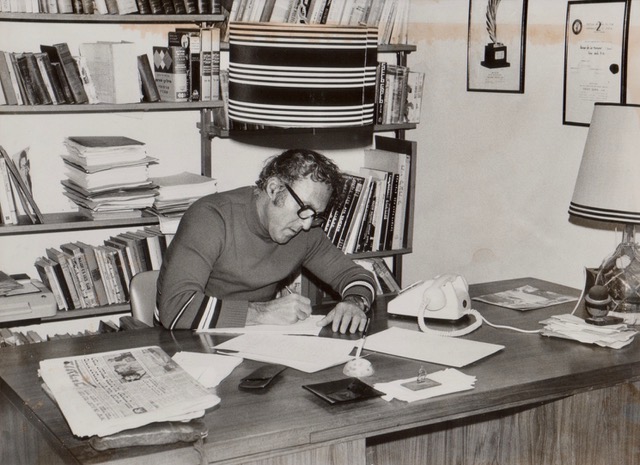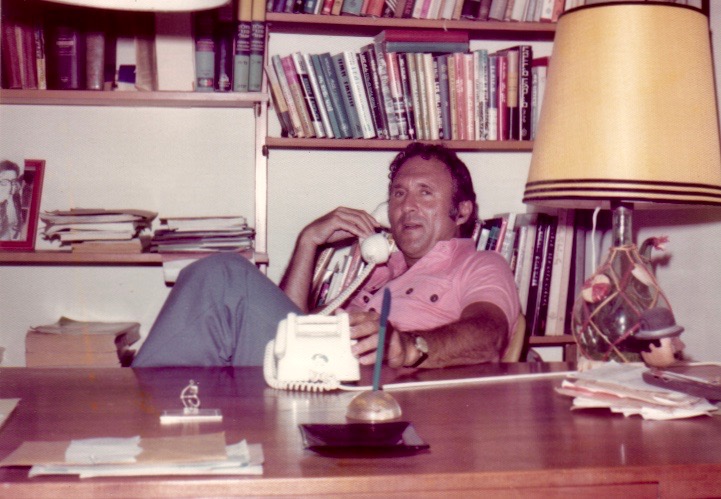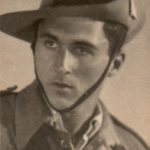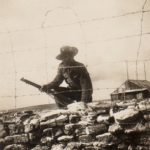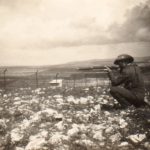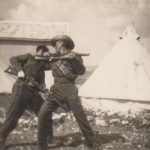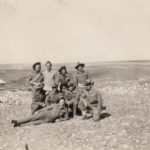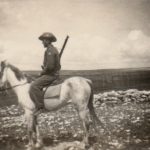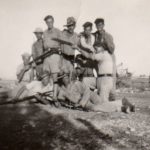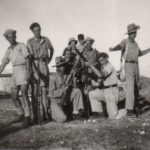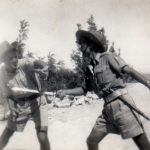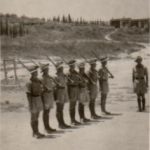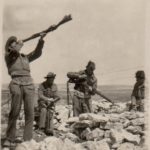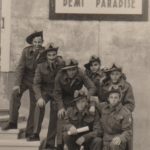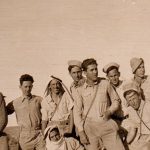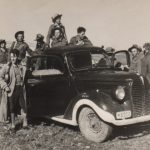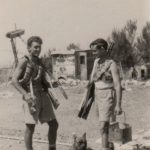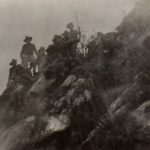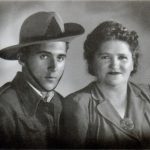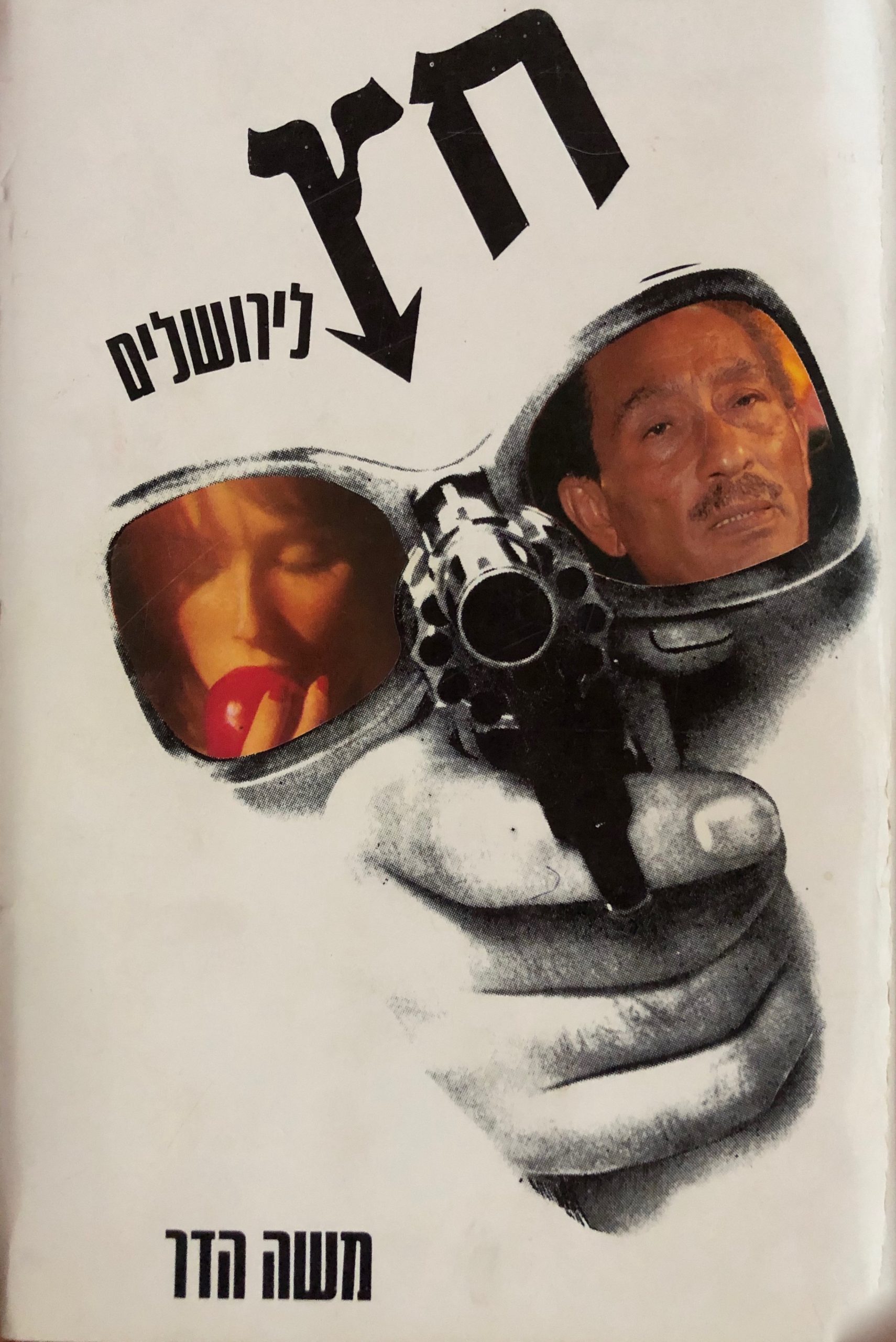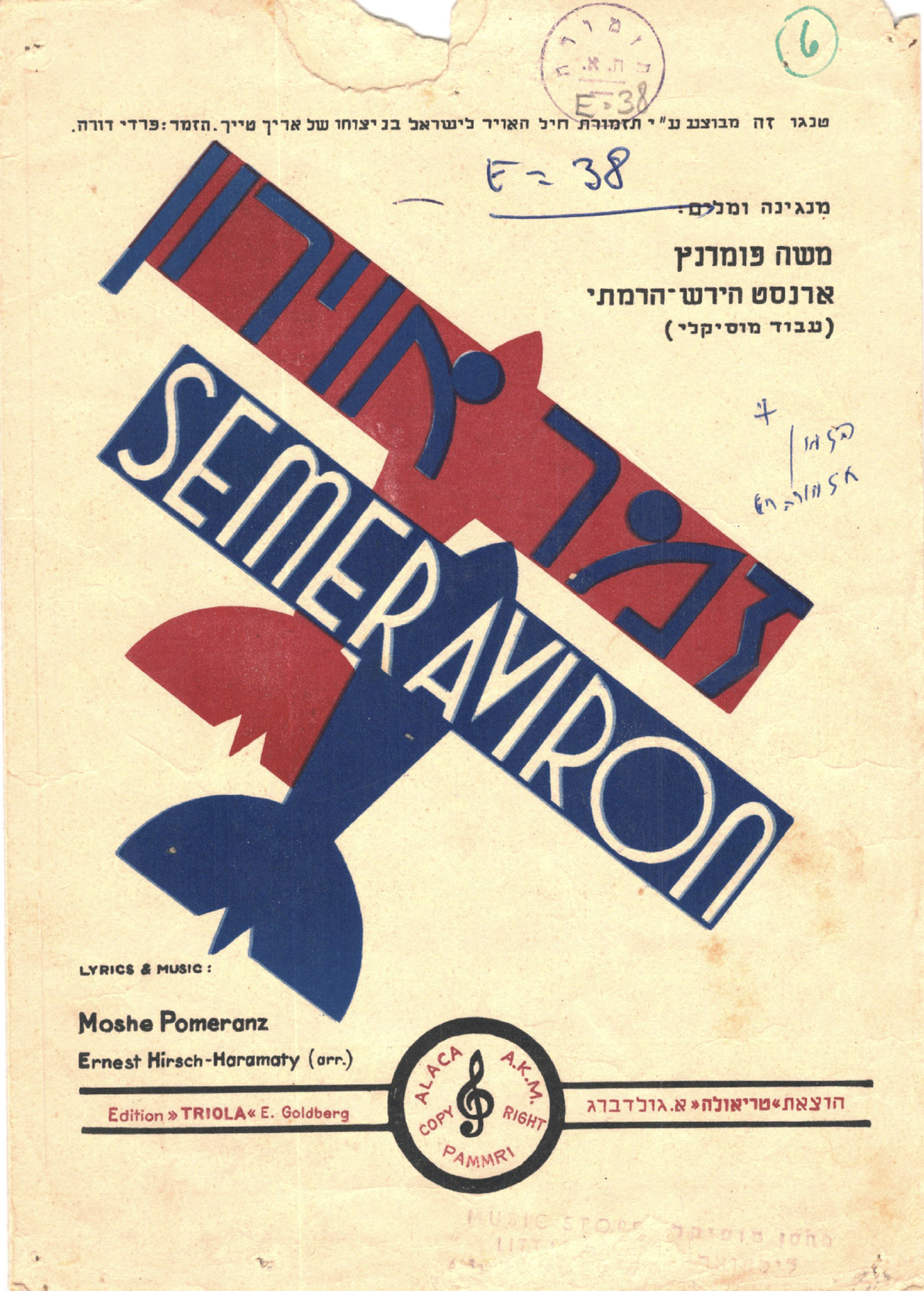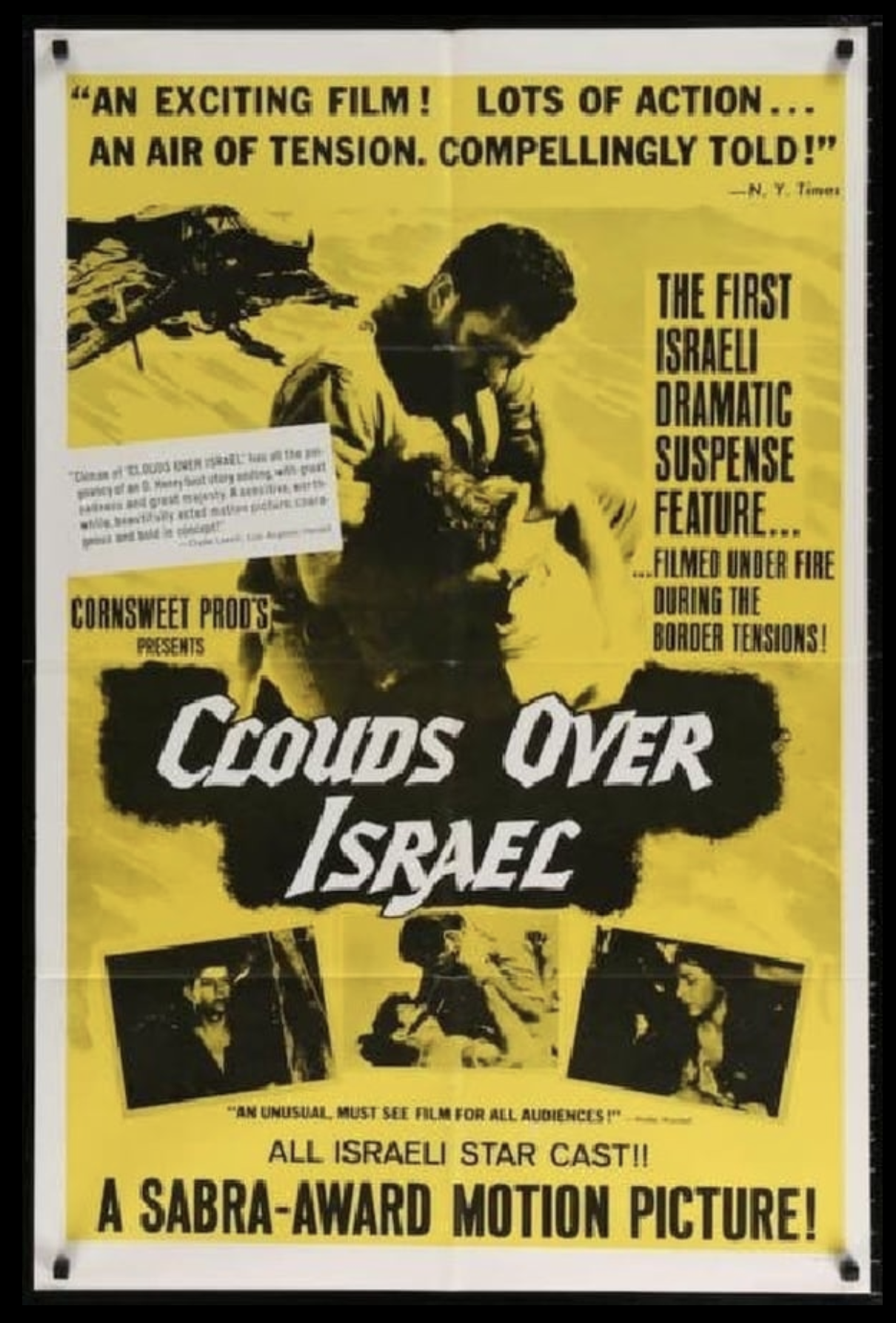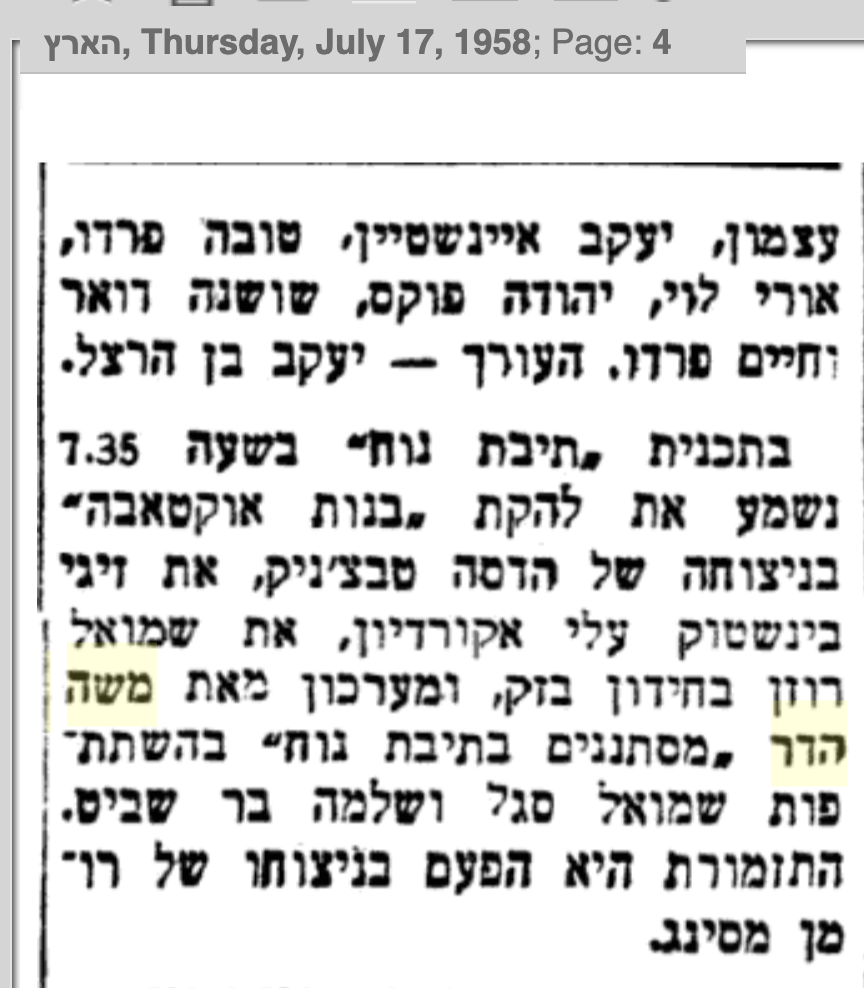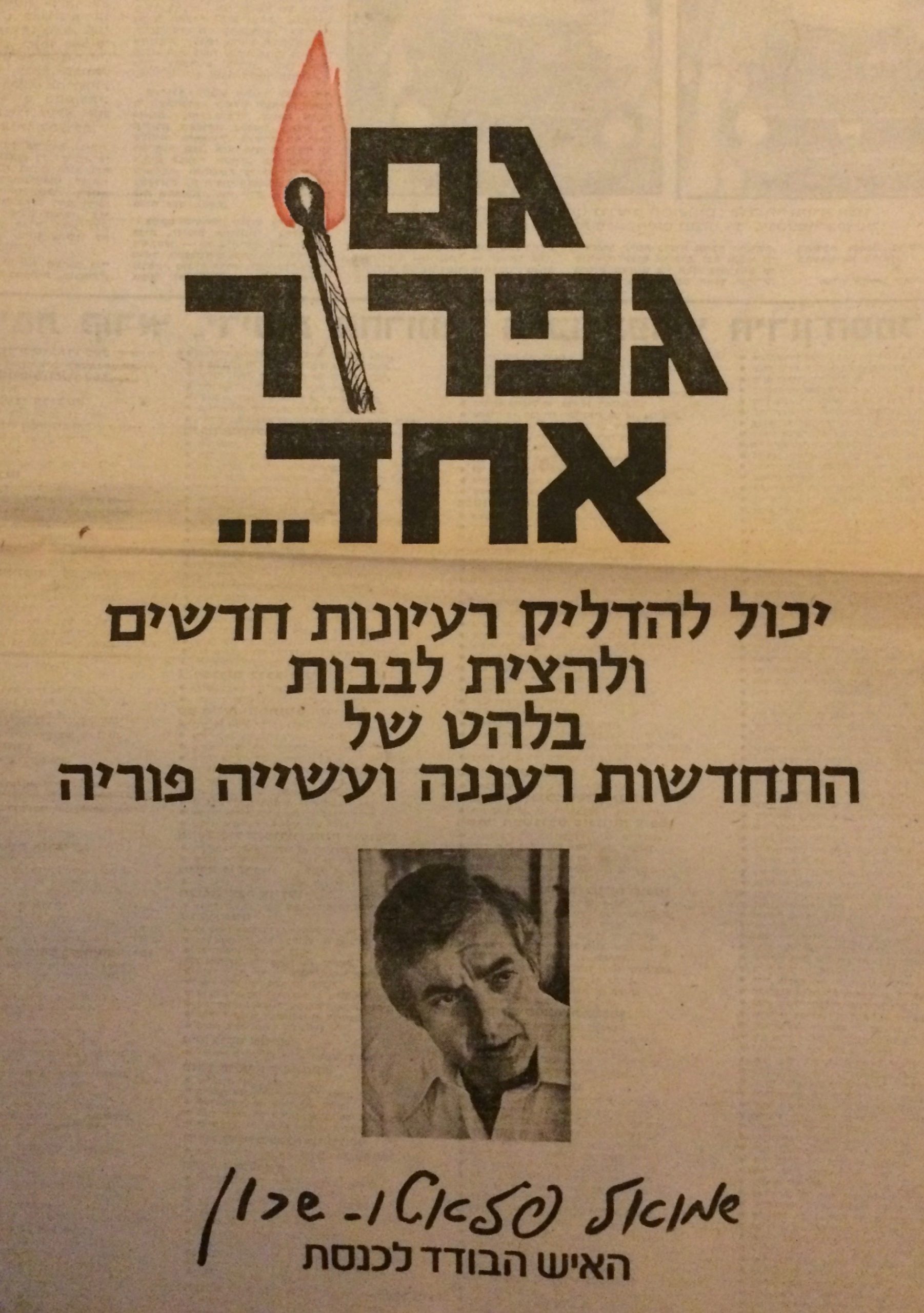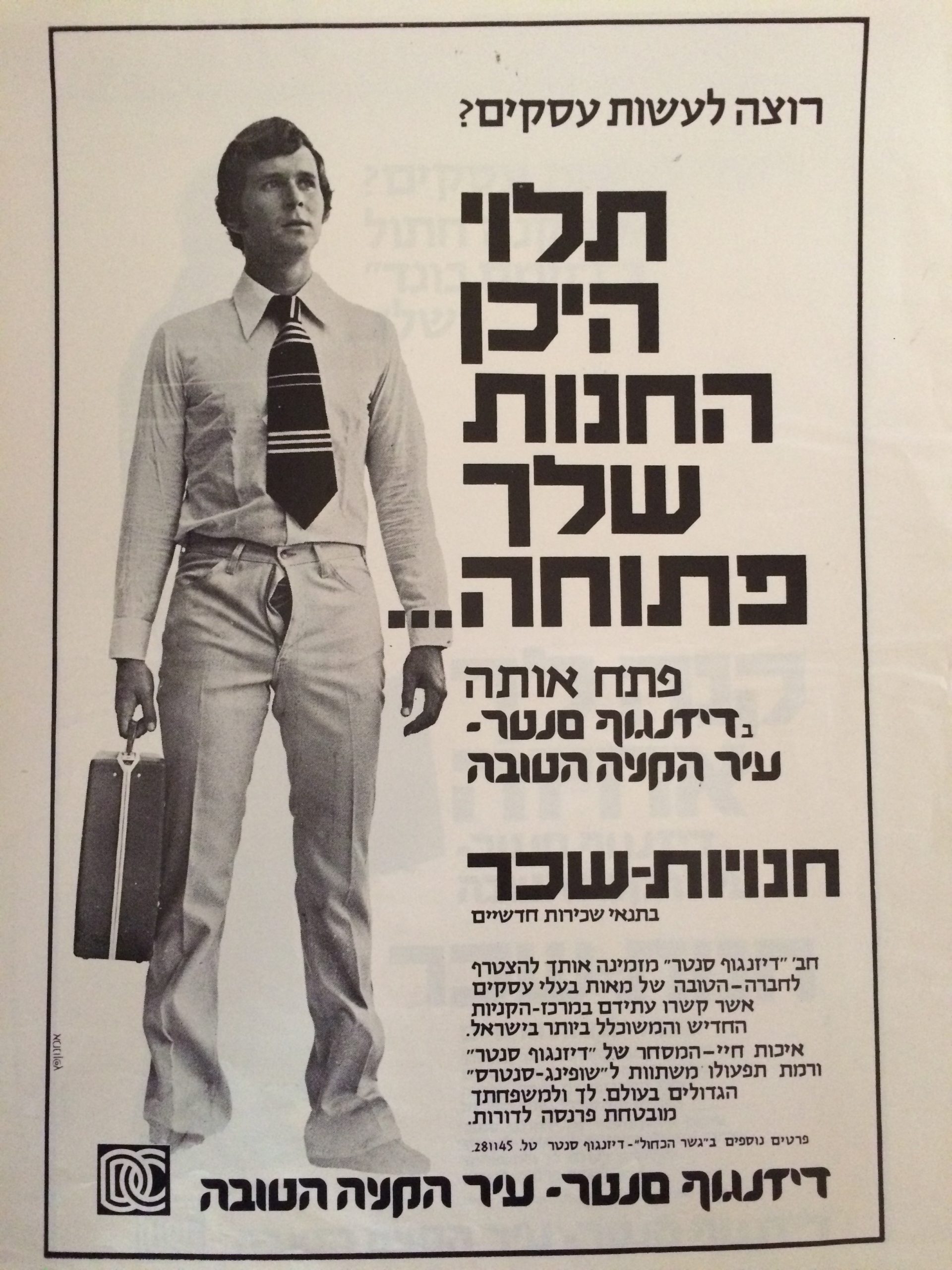P O M M Y
"To move forward towards achieving the desired goals on earth"
The “HE”, pronounce “WHO” in Hebrew was Pommy’s favorite column. It was written every day and published in each issue of the Israeli Air Force (IAF) pre-war and war magazines.
He…was Pommy’s version of T’zimukim (Raisins) – a humorous topical material column for pilots, maintenance crews, IAF personnel and reservists. After Pommy retired from the Air Force, Danny Mold wrote, "He…Left" (IAF Magazine November 1985 48 (149). In the article Pommy said, "My daily column is called 'He' and its writing was my favorite. In this column, I commented on the recent events in the Israeli Air Force and in its airbases".
In fact, a variation of "HE” began in 1948 under the column, "Little Leaves", which published in the three (and only) issues of the “first” IAF magazine, "Leaves."
The sprouts of the “HE” column could also be found in the earlier IAFmagazines appearing as columns such as “Feuilleton,” “Crumbs,” and “Gleanings,” many published under Pommy’s pen names.
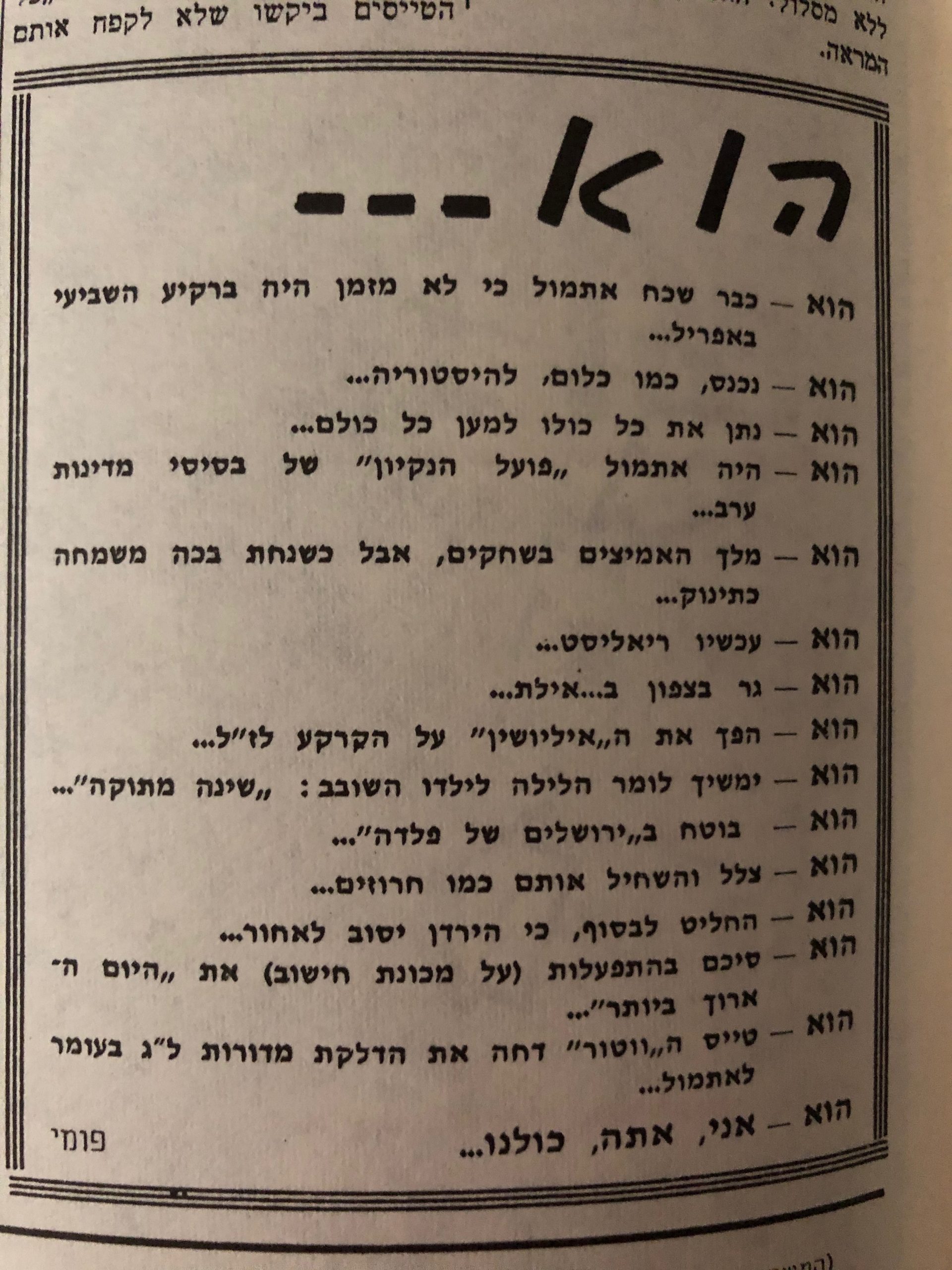
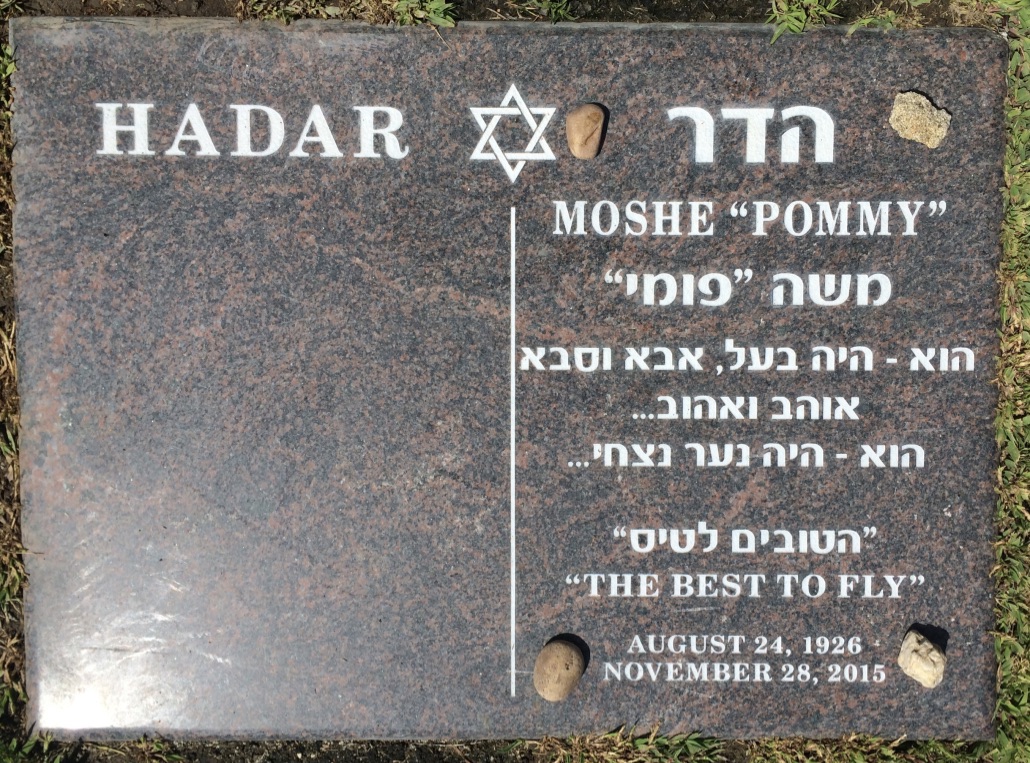
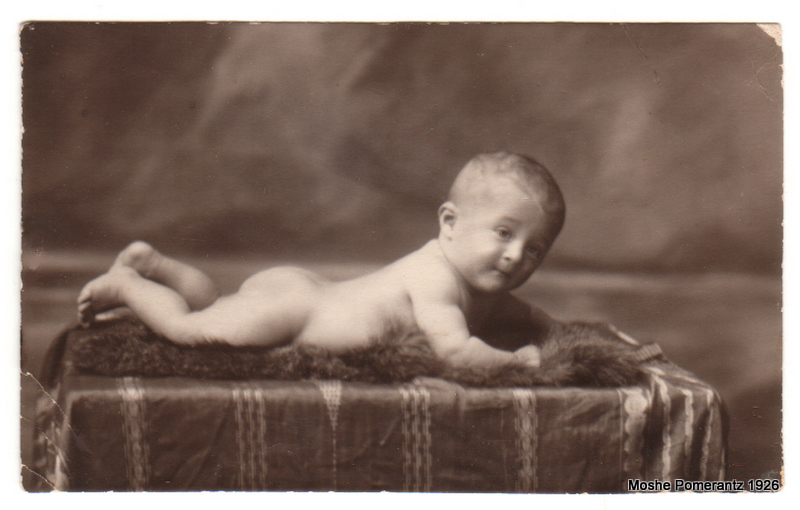
HE…Emerged
On August 24, 1926, Moshe Pomerantz, the newborn, emerged into the world, at the Hadassah hospital in Tel Aviv. The first and only son of Bracha Pomerantz, nee Zibenberg and Aaron Pomerantz.
Diapers serve people twice, once as babies and again as seniors
Hadar Sayings
HE…Was Orphaned at Age 4
Aaron Pomerantz died on the second candle of Chanukah in 1930 from TB. He was 29 years old at the time of his demise. Aaron was buried in the Old Cemetery in Safed.
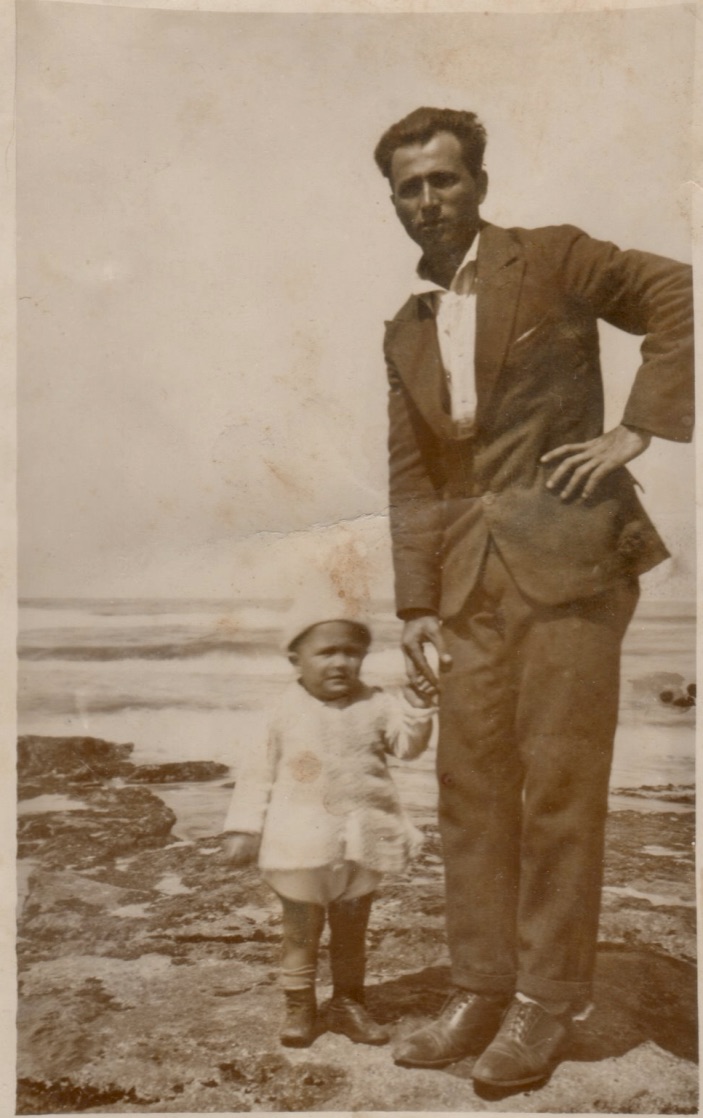
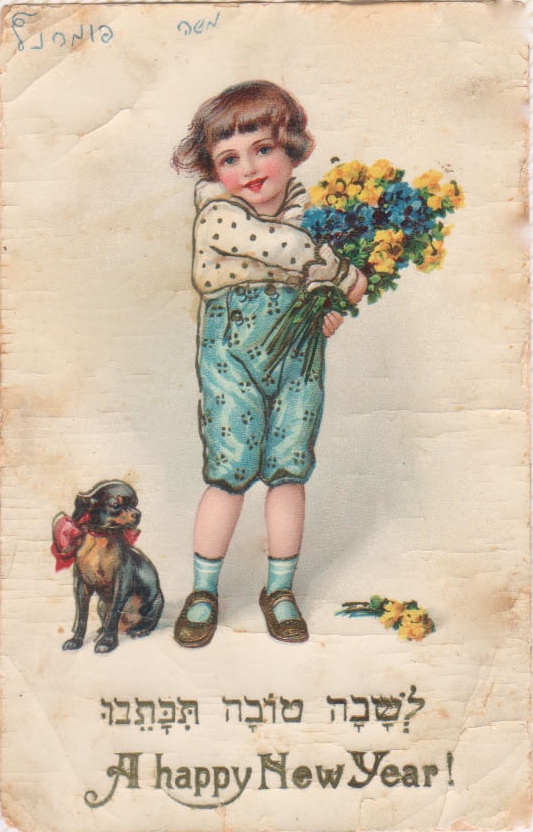
He...Kept and Preserved the Postcard
The Shanna Tova postcard was sent to Pommy, on September 8, 1930, from his father, who was hospitalized in the TB sanitarium at the Hadassah Hospital in Safed. This is the most cherished and only item left to Pommy from his father.
Translation of card:
Moshe’le my Favorite my Heart
I am sending you and yours my faithful blessing to the New Year that I will recover soon and fully and we will reunite and live together soon
From me, your father who never forgets you
Aaron Pomerantz – September 8, 1930
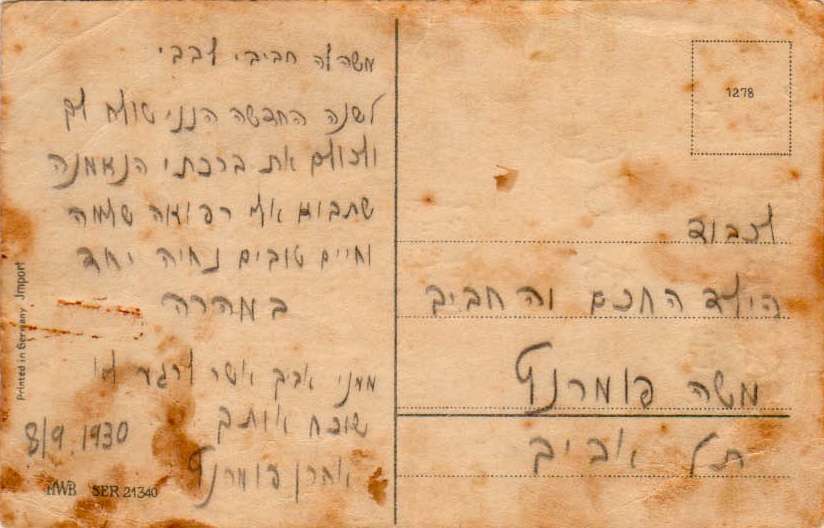
He...Lived at the First Working Neighborhood in Tel Aviv
The first working neighborhoods in Tel Aviv were built by the Histadrut or the General Organization of Workers in Israel. The neighborhoods were established with the aim of freeing the urban worker from the burden of high rent, improving living conditions and creating labor-workers culture. The first Workers Neighborhood ‘A’ was built between 1930-1931 and had thirty-five single-story private homes with an auxiliary half dunam farm adjacent to each home. It was designed by the engineer David Tuvia on a 30-dunams (7.5 acres) site. It was allocated on an existing almond vineyard owned by the Jewish National Fund, located between Shderot Keren Kayemet L’Israel (today’s Ben-Gurion Boulevard) and La’sal Street. The price of each house was about 350 lira Eretz-Israelit and most of the landowners paid it in installments. Pommy's father, Aaron Pomerantz, was the supervisor in charge of building the neighborhood (until he fell ill). The family home was located at 3 Shderot Keren Kayemet L’israel.
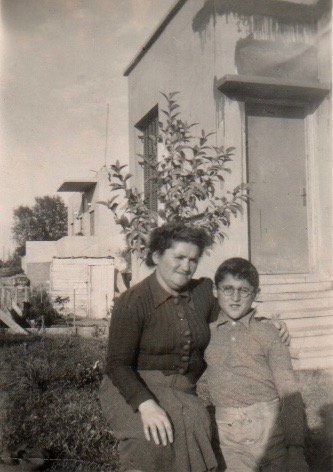
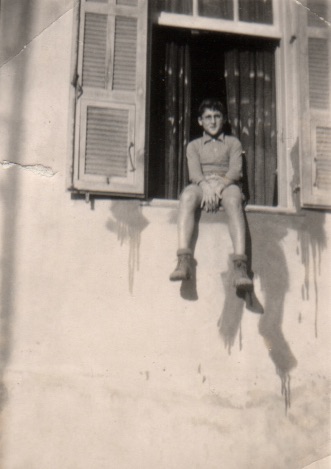
He ...Studied in the First Class at the Workers' Northern Tel Aviv Children’s Education School
Pommy began his elementary education, in 1931, the founding year of the Northern Tel Aviv Children’s Education School, after which it was named A.D. Gordon. His mother Bracha, a single mother, worked very hard and returned home late every day. The Northern Tel Aviv Children’s Education School answered that need, it allowed working mothers to work during the school hours, while the school provided a long school day and a hot meal for the children of the working mothers. It was a labor movement school, in the days when there were still no state education. The pupils would call teachers by their first names and not like the "bourgeois" schools, like "Le’Dugma,” which called them “teacher.”
Pommy’s teacher was an 18-year-young woman named, Rachel Yanchal (Sokolka). Twenty-nine years after teaching Pommy, she became his son Ronnie’s first grade teacher. And two years later his daughter, Etti’s first grade teacher.
Welcome First Grade
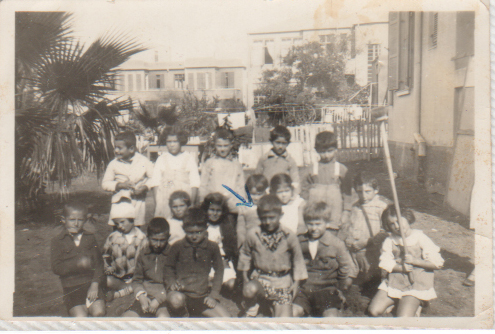
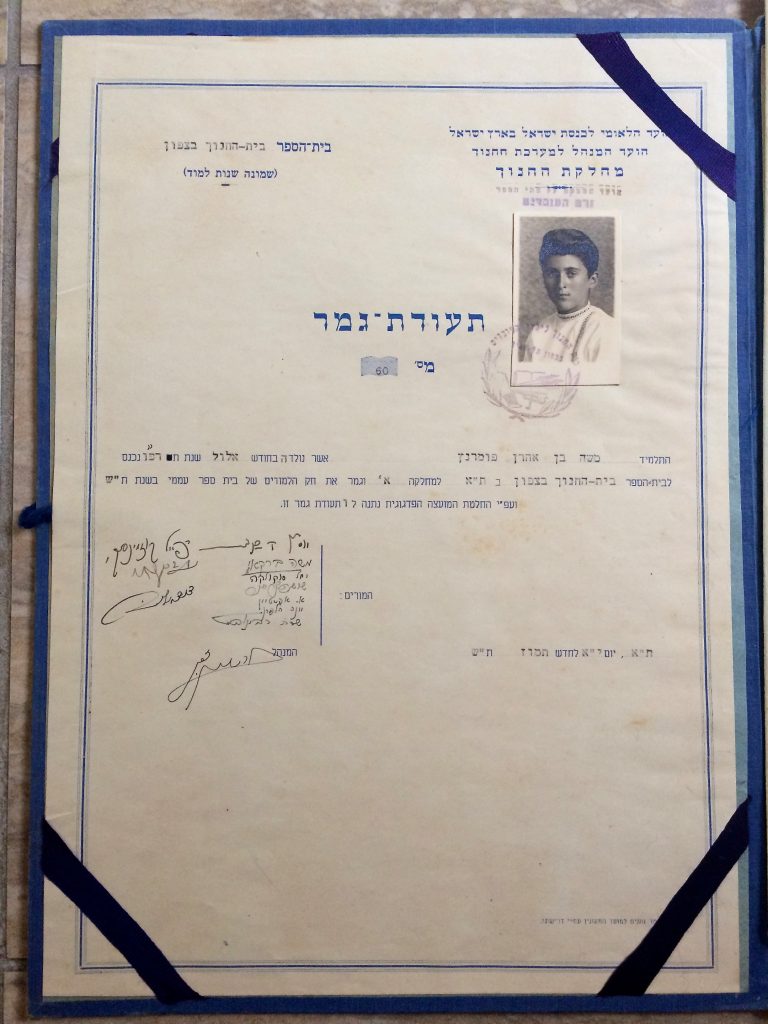
״מי שהולך לבית ספר לאהבה יישאר רווק״ – אימרות הדר
He...Played the Violin
At the age of ten, Pommy studied to play violin at the Music Art Studio in Tel Aviv under the violinist, Atara Glickson-Hertz. She was a well-known violinist and contributed greatly to the introduction of the refined musical taste during the first period of the growing Jewish settlement in the years following World War I.
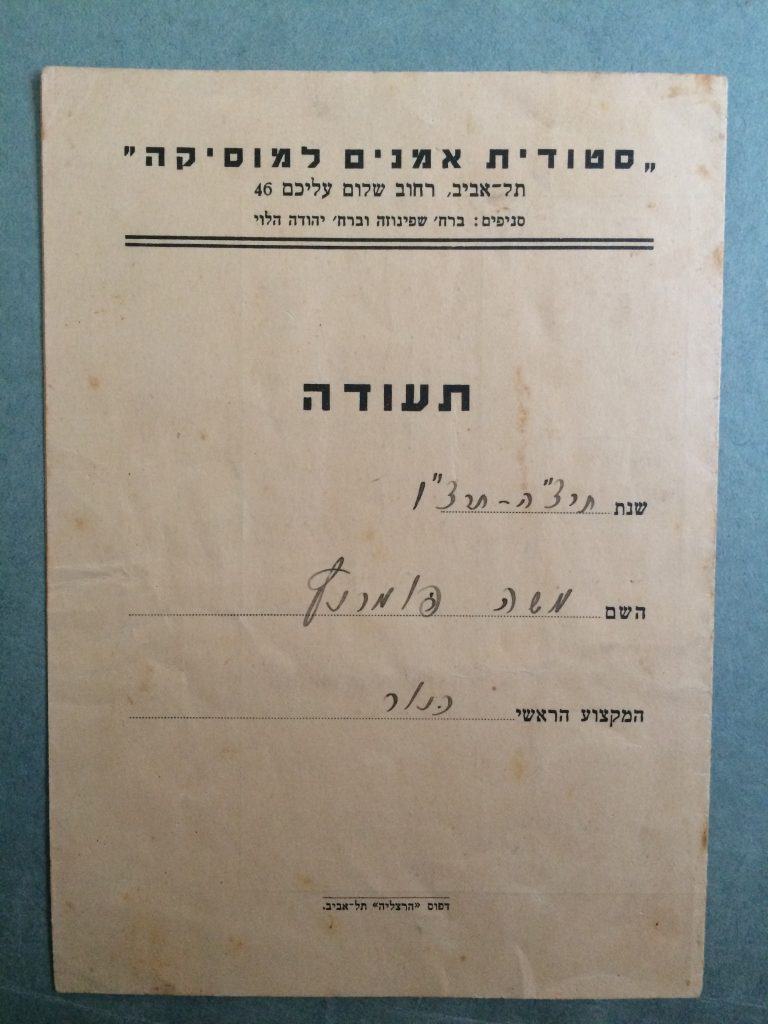
He...Began his Journalistic Career
In 1939, at the age of 13, Moshe Pomerantz was the youngest journalist in the State of Israel. Pommy was very fond of sports, strategy and tactics. He was involved in pole vault competitions, played soccer and was a gifted chess player. Pommy spent some of his free time, writing. One day he decided to walk all the way to the old central bus station in Tel Aviv, where a daily newspaper was published. Determined, he entered the printing press building that housed the newspaper offices. He asked to speak to the newspaper editor. The editor asked him, son what do you want? Pommy answered, to be a sports reporter. The editor, continued, have you written anything? Pommy took out an article titled, "A Glance from the Tribune." The article described the game through the eyes of a die hard soccer fan sitting in the bleachers. He handed the article to the editor, who took it and without looking, tossed it on his desk, laden with paperwork. He told the young Moshe to return in few days. Pommy, the driven young man, returned. The newspaper editor greeted him with a smile and said, you are the newspaper's sports reporter and you will also receive a press credential.

He… is a Leftie in a Right-Handed World
As a kid, Pommy started writing with his left hand. Throughout the ages, left-handedness has been associated with weakness, impurity or evil. This stigma was alive and “well” in the small community of Tel Aviv in the early thirties. The educators at Northern Tel Aviv Children’s Education School forced little Moshe to undergo "conversion therapy" and required him to write with his right hand. Although Pommy had to switch his writing hand, nevertheless, he could not switch his natural brain functions. Pommy's dominant hand remained the left hand. He threw, a ball with his left hand and did most tasks with his left hand. The additional (right) hand function could have (using Pommy’s style of word play) easily turned out to be a blessing in disgust but it turned out to be a blessing in disguise and set him apart from the rest of his peers. It guided him to find his passion and to live his dream as a writer and an idea man. This allowed Pommy to develop and train the two hemispheres of his brain, to thrive in the creative world and express his wide array of talents across multiple platforms. Having to overcome obstacles, and always challenge himself, ultimately proved fruitful.
The tendency for left-handedness has a partly genetic contribution and usually higher in the males in the family. In Pommy's family, both his son and his grandson are left-handed.
Interestingly, when Pommy once stumbled and fell, he tried to stop the fall with his left hand (the dominant hand) and broke it. He joked that something good had come out of his "conversion therapy," his important writing tool was uninjured and he could continue writing…with his right hand.
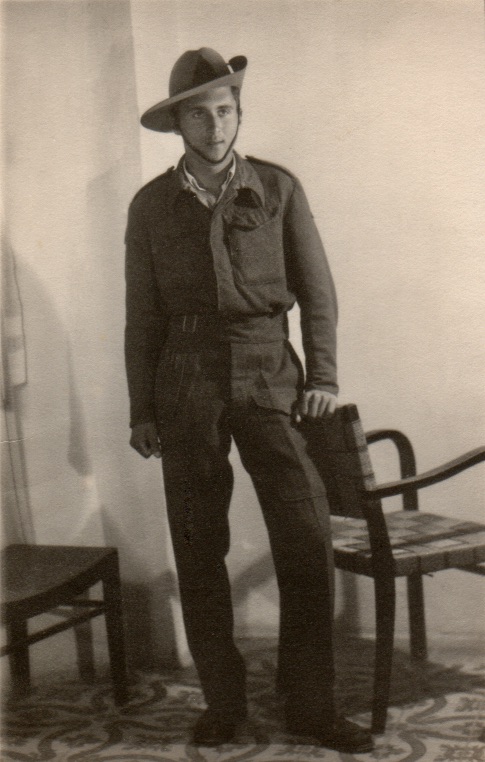
He...Enlisted in the Auxiliary Police Force
In September 1944, Pommy enlisted as a Noter lit. guard. The Notrim (lit. guards) were a Jewish Police Force set up by the British in Mandatory Palestine. Many of the thousands of young Notrim, were later part of the Haganah. Pommy first experience of military training took place in Mount Atzmon and in Ein Ha’schofet. The Notrim forces wore a special uniform. Australian wide-brimmed hat, with folding on the left. This folding is designed to allow the rifle to be carried on the left shoulder for long walks. On the left margin of the hat was a triangle indicating the area to which the Noter belonged. They were equipped with weapons, such as shotguns and army rifles. Pommy had a horse named Diana. The British authorities maintained, financed and armed the Notrim until the end of the Mandate, even though they knew that although the force was nominally answerable to the Palestine Police Force it was in fact controlled by the Haganah.
"War is a disease whose only cure is peace"
Hadar Sayings
He...Rebel With a Cause
After Pommy completed serving in the Auxiliary Police Force, his family, especially the uncles, felt duty-bound to advise him on future vocation. They wanted him to have a profession in a respectful field, similar to the one they chose, with a job security and an ability to support a family. In September 1945, to his dismay, the 19-year-old Pommy, enrolled into the M. Saburai School of Commercial Sciences. Eleven (agonizing) months later, on August 30, 1946, Pommy received a certificate that he passed the required exams in the studies of: 1. Accounting. 2. Trade Theory. 3. Commercial account (see photo and certificate).
After the completion of the course, Pommy approached his family and informed them that he did what they requested. He added, “I am not interested in this profession. I will be a publicist and a screenwriter.” In the mid-1940s, in Israel, the family members, did not know what demons invaded Pommy. They called his aspirations, in Yiddish, "Luft Gesheft" (literally “Air-Business). As the years progressed, they were extremely proud of his rebellion and success. The great part of this story (pun intended), is that the “Air- Business,” indeed, launched Pommy’s career
The frozen man - Pommy second on the right
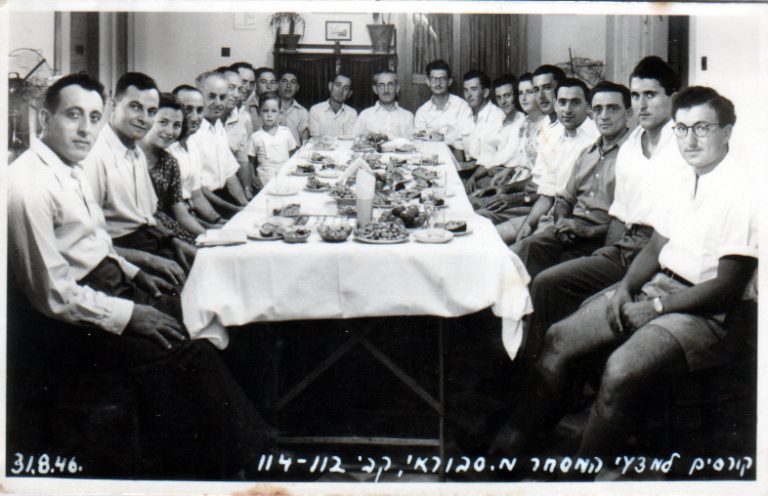
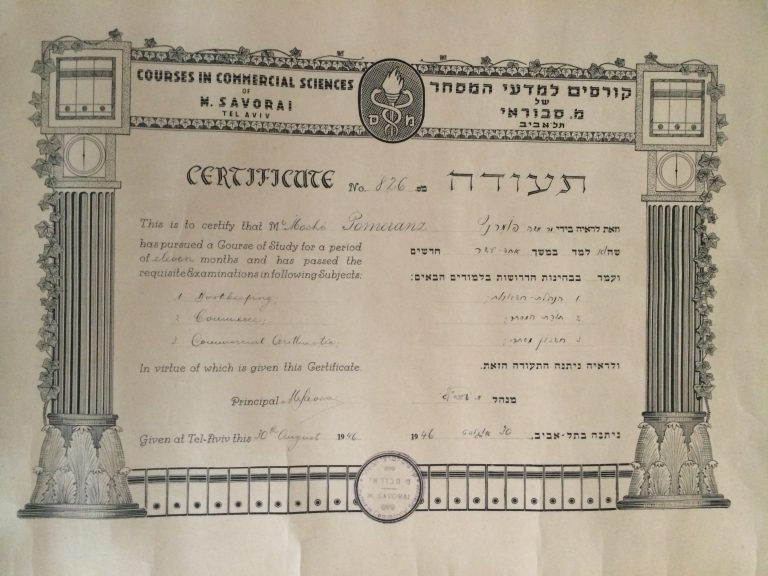
״מבחן הבגרות החשוב ביותר הוא חשבון-הנפש״ – אימרות הדר
He...Joined the General Aviation Council in Israel
In the article "50-years-to the slogan Hatovim La’tays" “The Best to Fly”, (February 24, 2010), Pommy wrote, "The aviation bug afflicted me in 1947, about a year before the proclamation of the State of Israel. At that time, I worked for the General Aviation Council at 9 Montefiore Street in Tel Aviv. The Aviation Council, which was a cover-up for the Haganah's underground air force, was housed in only two rooms. The severe shortage of funds and the constant financial crisis never stopped (see the article under Hatovim Latyes
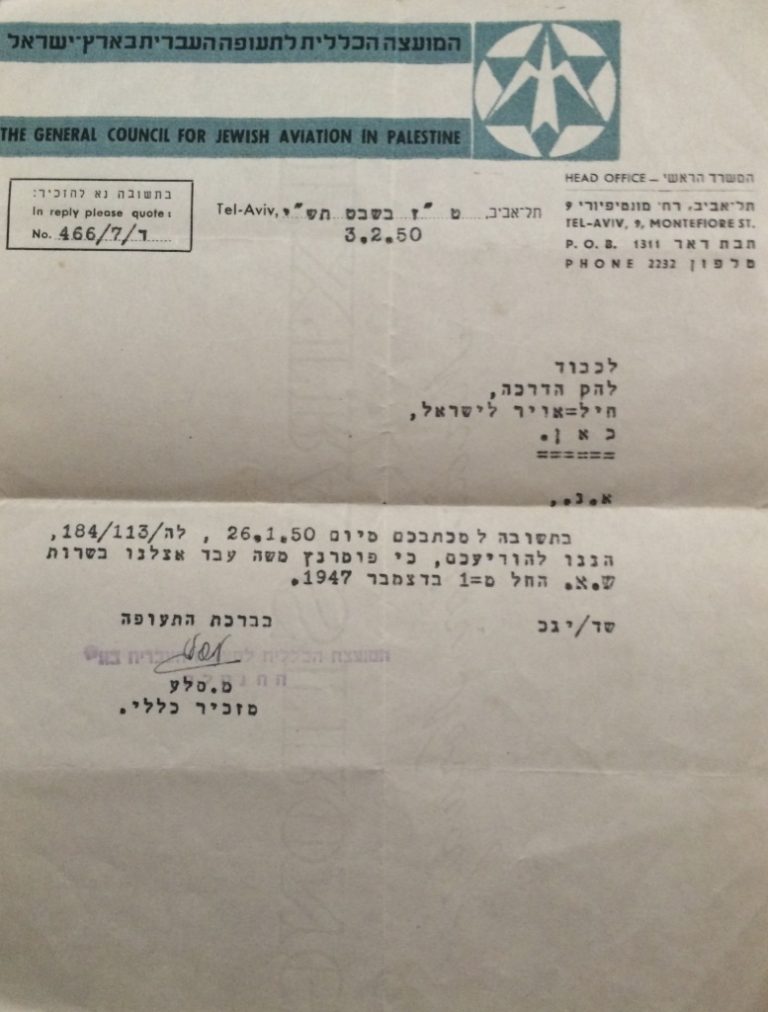
הוא...ערך את בטאון חיל האויר מ-1948, אבל קבל מינוי ב-1950
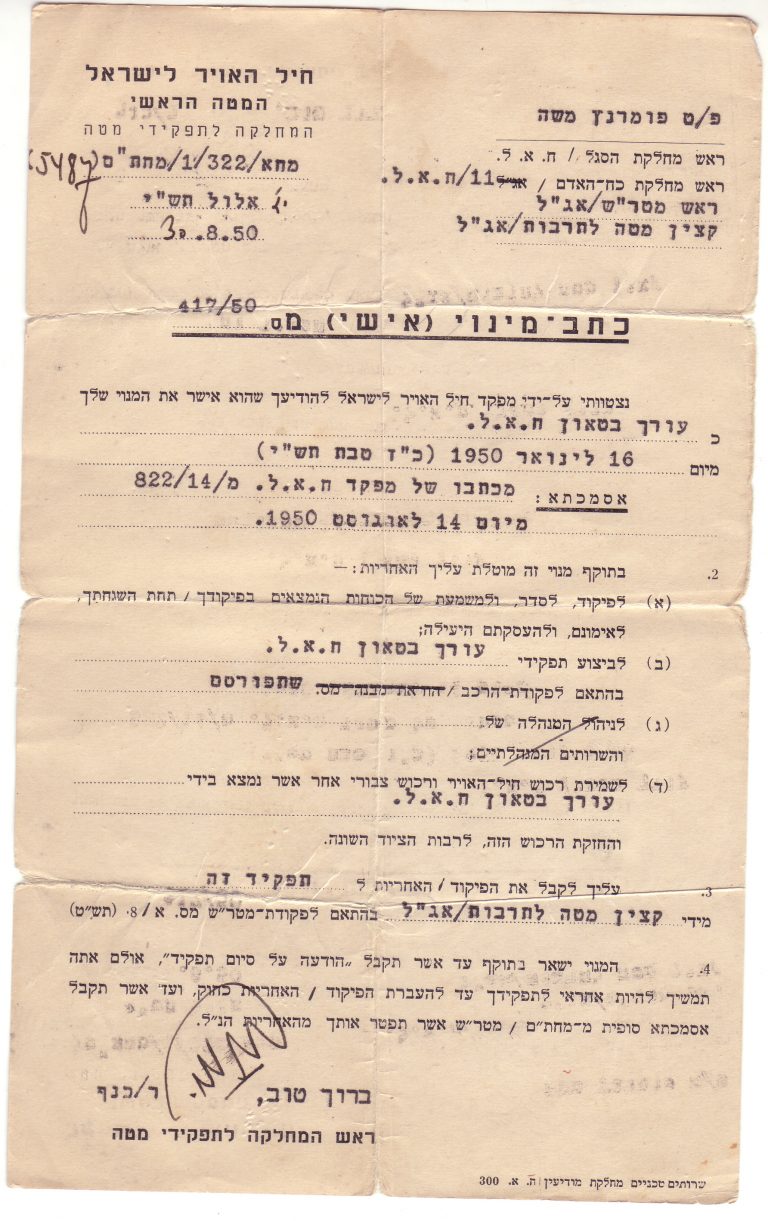
He...was a Friend of the Ben Gurion Family
Aaron Pomerantz was a friend of David Ben-Gurion. The common interest in the workers' movement and the General Histadrut Labor Federation, helped to further cement their relationship.
Aaron, who was the founder of the Rypin Group, later the construction group, Barzilai, and a member of the first kibbutz commune in Tel Aviv, was a manager at the Construction and Public Works office, which later became Solel Boneh construction company. As the first builders of Tel Aviv, Aaron and his wife, Bracha, bought a piece of land in the Workers ‘A’ neighborhood. The plot was at 3 Shderot Keren Kayemet, several doors down from David and Paula Ben-Gurion's plot.
After Aaron's death in 1930, Ben-Gurion and especially his wife, Paula, took Pommy, who was four-years-old, under their wings, as neighbors and as family friends.
On May 15, 1948, in the early hours of Saturday morning, the day after, Ben-Gurion proclaimed the Israeli Declaration of Independence in the Tel Aviv Museum (today known as the Independence Hall), Pommy was at Ben-Gurion’s study when President Harry Truman called, announcing that the United States recognizes the new State of Israel.
Pommy was a close friend of the Ben-Gurion family. Paula Ben-Gurion would send him on various chores. On one occasion, the market owner refused to give him groceries for Paula, as the grocery tab for the month was not paid. Apparently, Ben- Gurion’s son, Amos used to buy on tab, sweet cream (an expensive product at the time) and fed it to the family dog.
In 2010, Pommy wrote an article, in which he recalled, "The good relationship between my family and the Ben-Gurion family propelled Paula Ben-Gurion to show interest in everything that happened to us. Paula would stop me at her gate, smiling wholeheartedly, she said, ‘So you are Moshe in the Air Force ahh? But my Amos is in the police.’ Her son Amos Ben-Gurion (later) became the deputy chief of the Israeli police. Paula was actually following the growth of my children as well. When my wife was passing by Ben Gurion’s House. Paula, who stood often at the gate next the policeman's booth, would stop my wife who was pushing our son’s stroller. Paula would chat about the child's development and well-being, while dispensing loving suggestions."
On one occasion, Paula stopped my wife with our son Ronnie in the stroller. She pointed behind her, asking, ‘Ronnie’le, who lives in this house?’ Ronnie the toddler, who always saw from his point of view the guard booth, did not hesitate to respond and said: "The cop!"
Few weeks after the Declaration of Independence Pommy attempted to ask the “old man” for funds to the Israeli Air Force. Wearing a blue shirt and khaki shorts Ben Gurion flipped the khaki shorts and alluded to the fact that there is no money." It wasn't long before Ben-Gurion realized that the main purpose of the Israeli Air Force was to destroy the enemy air force, and in order to accomplish this goal it needed an organized air force. The funds began to flow. (See Air Force Foundation Day – One of the Decisive Beginning of Our Way to Victory, Ben Gurion speech, October 27, 1948)
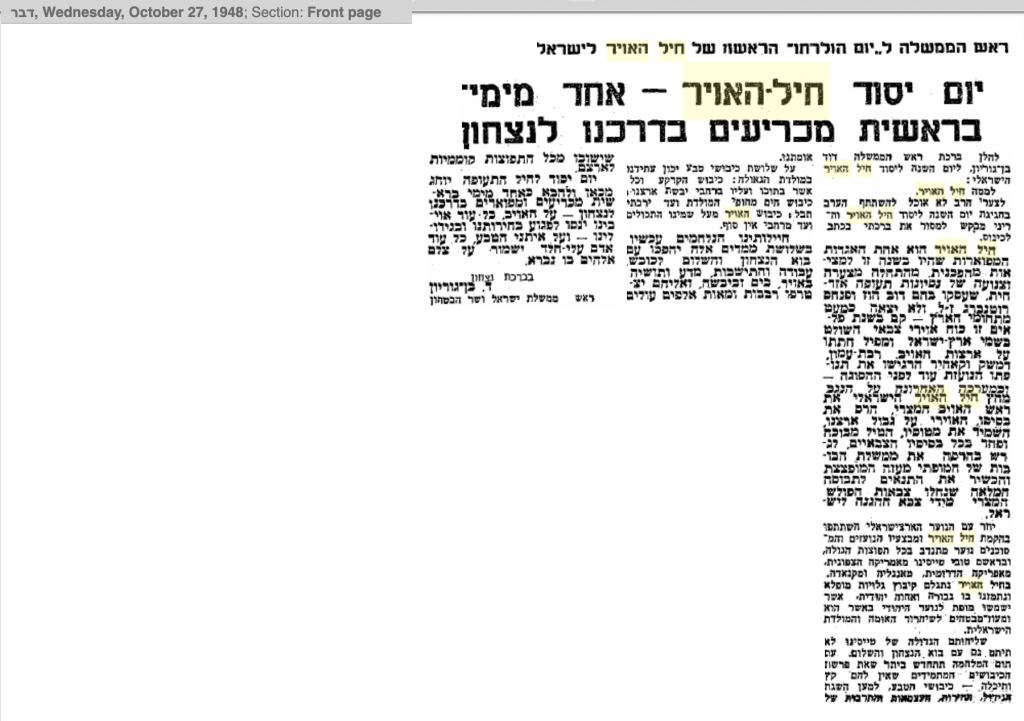
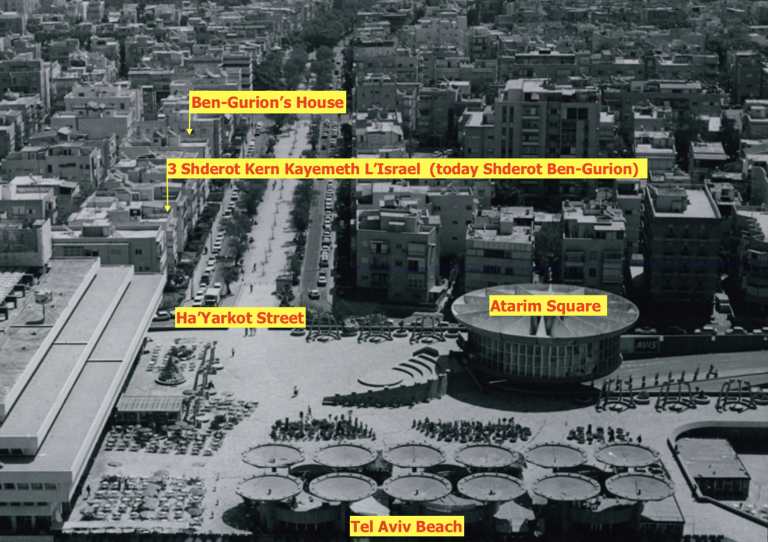
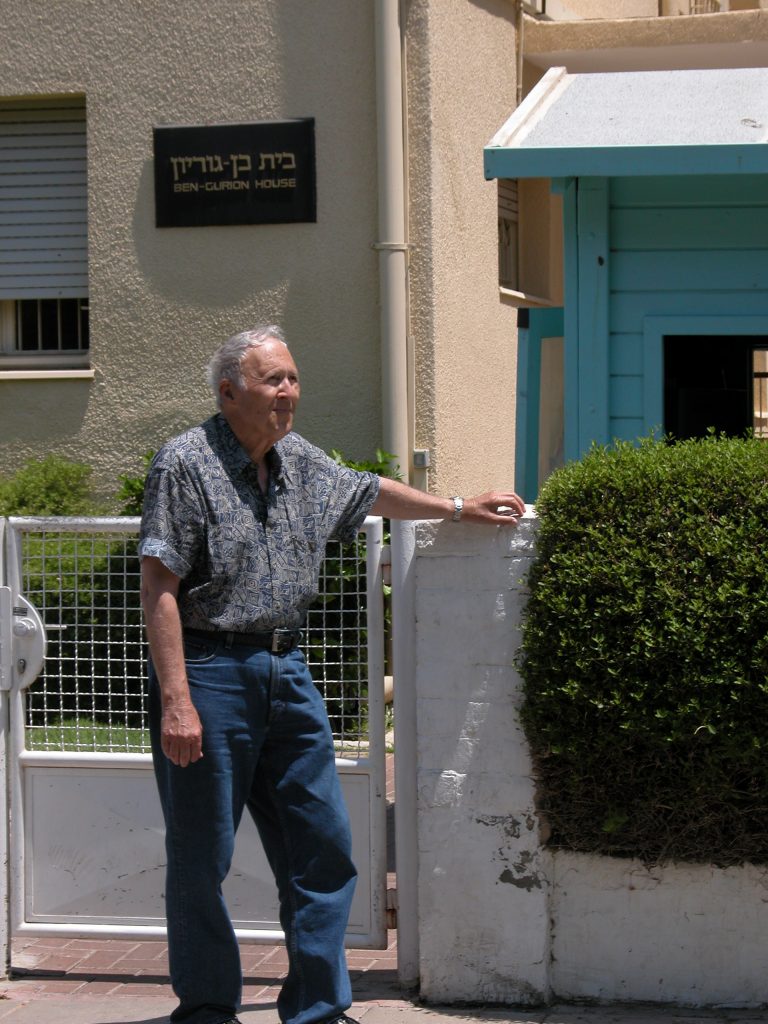
Pommy in front of Ben-Gurion House, 2006
Notice the, enernal, blue guard booth, on the right
He…and She
It all began in 1949, on the fifth floor of the Continental Hotel in Jaffa, where the Israeli Air Force headquarter was housed. A young reporter, named Benny, working at the Air Force Magazine, tried to court a graceful and sweet female soldier. He wasn’t her type and she gently rejected his attempts. The reporter did not flinch and offered her to meet his boss, the magazine editor. Pommy invited the female soldier to his office, using an excuse that he was preparing an article. He… took a peek at the blue-eyed young soldier, Bella Levin, and was smitten. Pommy asked one of the photographers to take her picture in the communication room and to start the interview process. He then joined them at the entrance to the headquarters. The photographer left and Pommy initiated a conversation with Bella, at some point, he decisively declared, "You are busy, Sunday, Monday, Tuesday, Wednesday, Thursday, Friday and Saturday."
Pommy nicknamed Bella, Moody, short of Hamooda, sweetheart. They were married on September 3, 1950. Moody was Pommy's muse and co-pilot, she served as his primary audience, through which he "tested" all his materials and ideas. He always listened and respected her views, sense of humor, sensitivity and sensibility. They have loved and laughed together for 66 years. Since Pommy passed away, a bird has started appearing daily, next to Moody’s main living room. We named the bird, Pommy
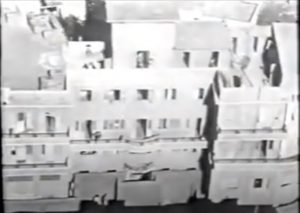
Continental Hotel, the Israeli Air Force Headquarters, Jaffa, Israel, 1949
From the movie The Black Spitfire
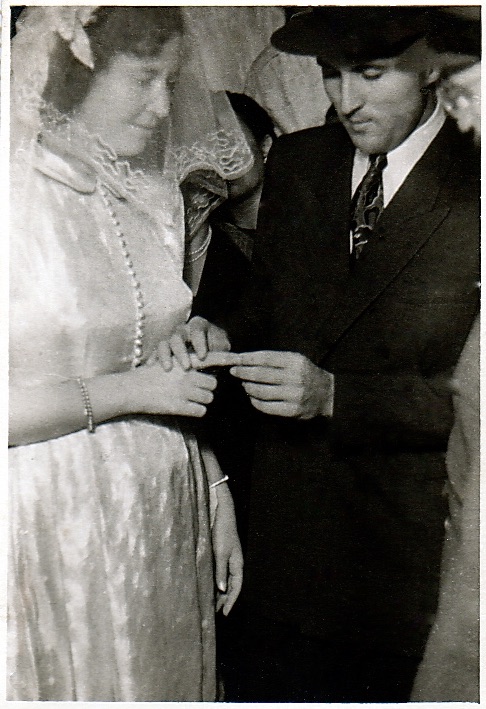
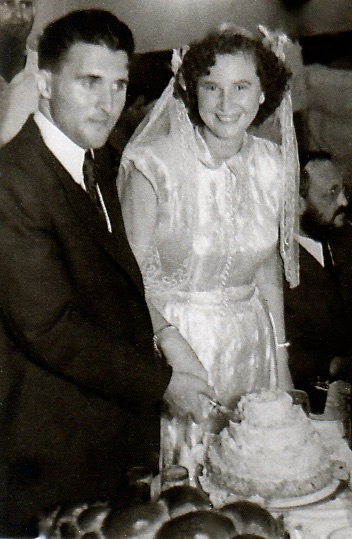
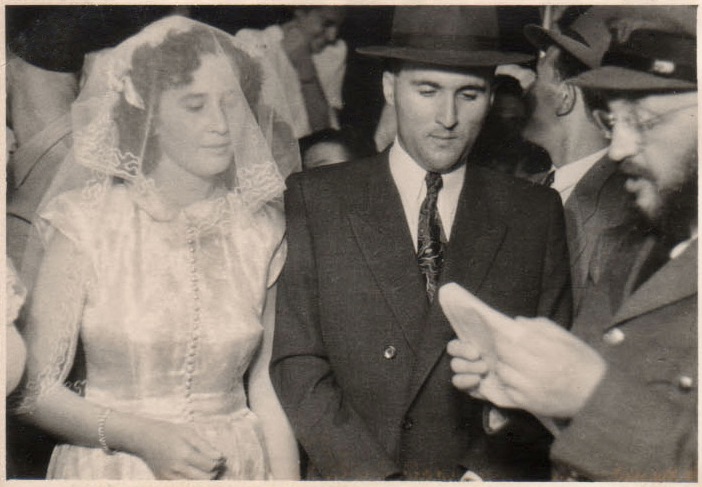
"A white wedding gown could quickly turn black"
"The size of the wedding doesn’t point to the size of the love"
"The only thing that leads to divorce is a wedding"
"Cold feet before a wedding warm up quickly on the wedding night"
Hadar Sayings
״Love also blooms in the winter״
"You don’t need contraception, if you make love online"
"A pacemaker run out of battery when his owner falls in love"
"Many people study love all their life and still get F on the exams"
Hadar Sayings
From 1952 to 1955 Ma’ariv Newspaper held an annual competition called "Scripture." Pommy, wrote an article called, "The way of Life and the Way of Death." A true story and emotional account, describing how a young couple (Pommy and Moody) deal with the bereavement and tragedy of the death of their eight-day-old daughter. Pommy won the first prize for the article. Being an enlisted military man, he wrote the article under a pen name, so his wife, Moody, went in his place. The award was presented by Mr. Ezriel Carlebach, the editor in Chief of Ma’ariv Newspaper. In the prize money, the young couple bought two down blankets.
At the time of writing the article, "The way of Life and the Way of Death," Pommy, the wildly imaginative screenwriter, did not fathom that reality surpassed the imagination, and that "Zelda" (the affectionate name, which Pommy named the baby) may not be dead, rather, stolen from the hospital and given to well-to-do and childless parents. The hospital, never provided a death certificate, nor a burial place. All efforts to find information have reached a dead-end. Over the years, Pommy would often talk about "Zelda" and always indicated with a painful smile that when he will find her, his two children would have to divide the inheritance by three.
Throughout his professional career, Pommy has used diverse pen names such as, Poma, Pommy, P – – H, M., A”F, Yechiam-Amikam, Aaron, Bonboniera, Hamuda, Avi Ronnie, Moshe Ben-Aaron, Bella Pomerantz, Bella Levin, Kenny Bell and more
He...Hebraized his Surname from Pomeranz to Hadar
David Ben-Gurion was obsessed with Hebraization the surnames of the citizens of the State of Israel, from foreign names to Hebrew names. His desire was to forge a new identity in a new land and to express ideological identification. He set an example by changing Gruen to Ben-Gurion, thus rejecting the Diaspora and the name he had forcibly given there. In 1948, Ben-Gurion wrote a letter addressing the matter to all the IDF officers, "It is desirable that every commanding officer should change his surname in case they are German, Anglo-Saxon, Slavic, French and foreign to a Hebrew surname, in order to be a role model for his soldiers. The Israel Defense Forces must be Hebrew in spirit, vision, and in all internal and external expressions." In June 1955, Ben-Gurion, as defense minister, sent a directive to then-chief of staff Moshe Dayan, addressed to the IDF soldiers, emphasizing that civilians should have the dubious right to keep foreign surnames, but at least standing army soldiers should have Hebrew surnames. However, the defense minister does not have the authority to impose an obligation to do so. Nevertheless, Ben-Gurion stipulated to all the soldiers that anyone who represented the state of Israel in a formal capacity – must have a Hebrew surname, otherwise, he would not send them abroad.
In 1955, Pommy, as an Air Force officer, was asked to represent the Corps at an Aviation Film Festival in France. For years (at least from March 1949) Pommy used the pen name, Moshe Hadar, when he wrote articles to the Air Force Magazine, although the editor's title was: Moshe Pomerantz. It must be presumed that his personal relationship with Ben-Gurion, and the pressure that the "old man" had put on Pommy, in those days, trickled in and Pommy had begun the transformation, first as a pen name, until he had no choice but to legally change his surname.
One may surmise that Pommy felt ambivalent about the name change. Pomerantz was his real and only connection to his father, a badge of honor. Pommy later stated that the Hadar name, at that time, was one of the first. No one else bore the name Hadar. On February 25, 1955, "Soldier Moshe Pomerantz" changed his surname to Hadar, at the Tel Aviv Registry. The name Pommy, which is a nickname of Pomerantz, continued to accompany him throughout his life. It's the only name his wife Bella (Moody) ever called him.
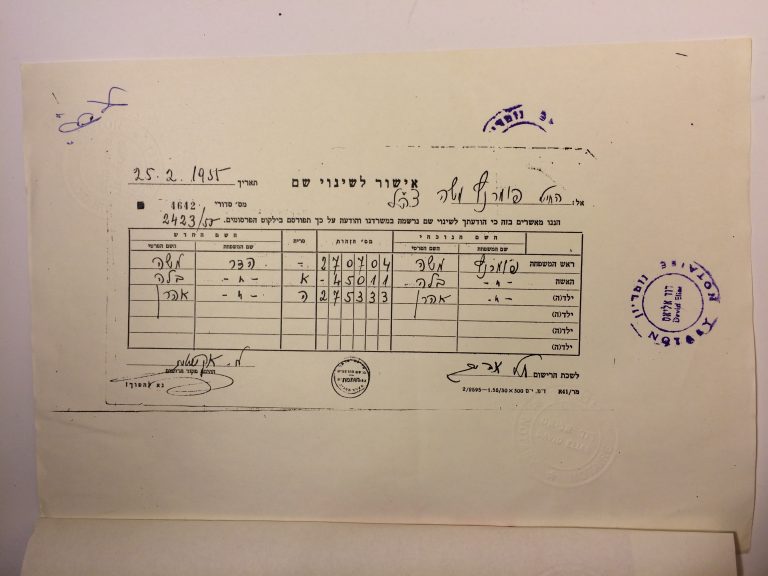
"The first Man didn't have a last name"
Hadar Sayings
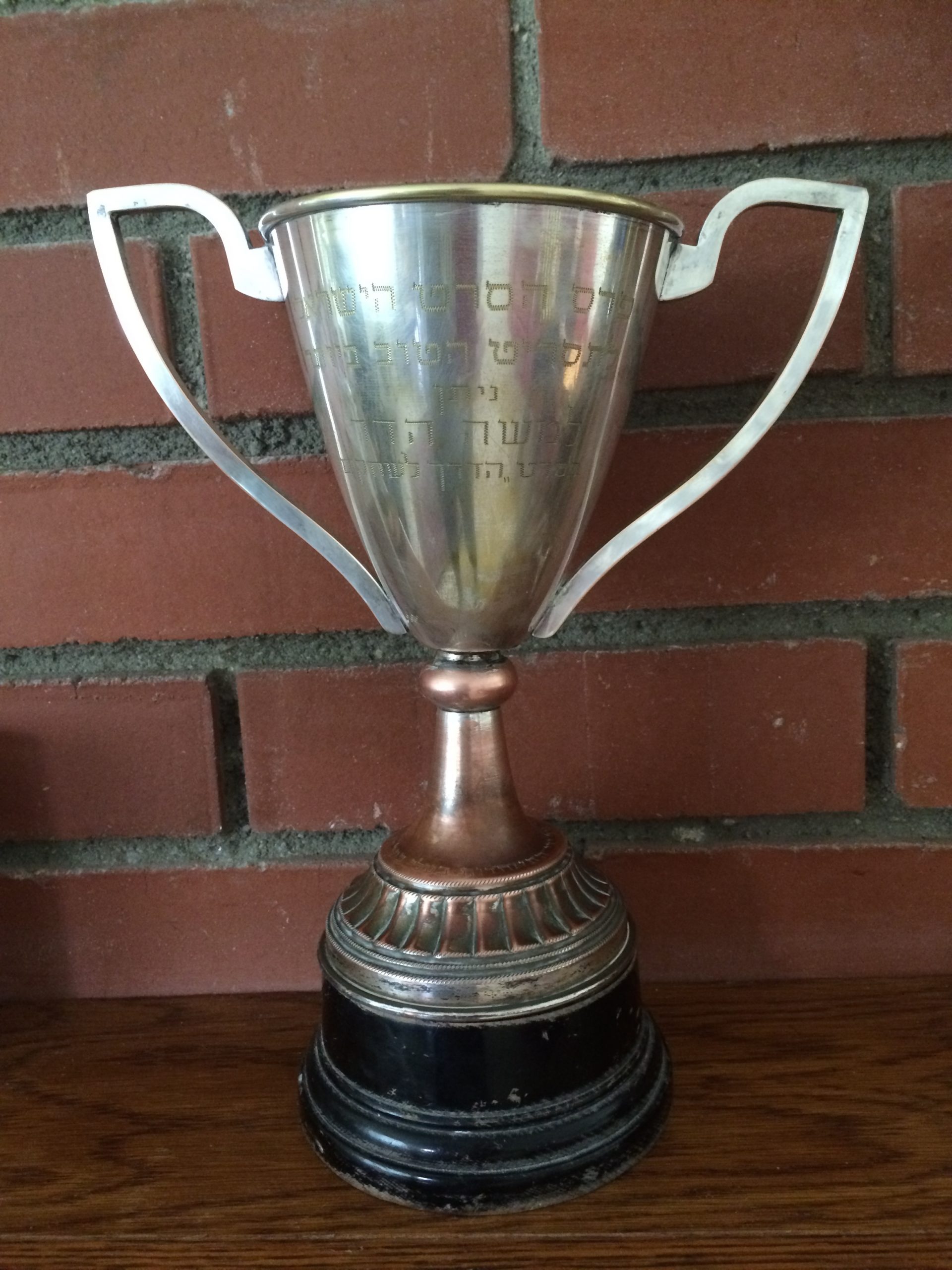
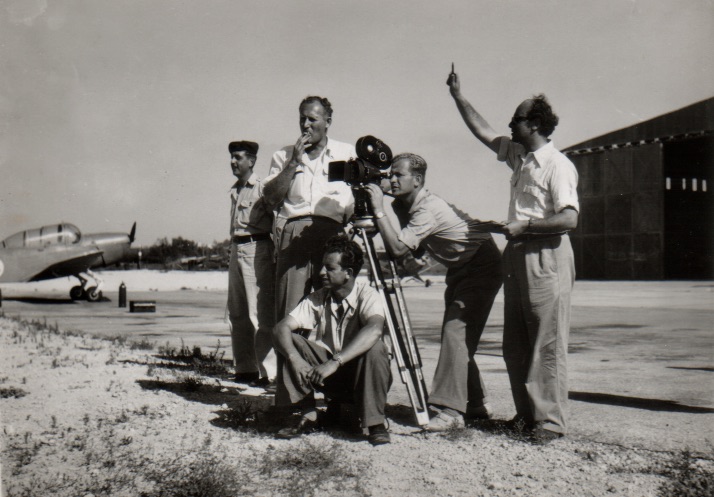
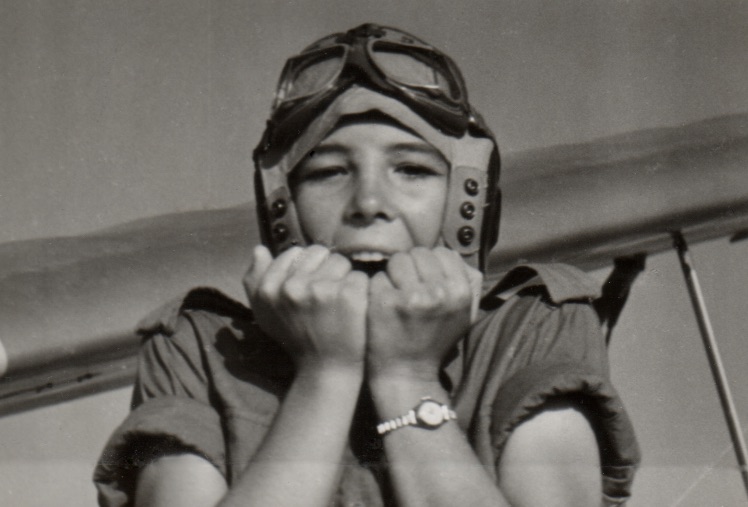
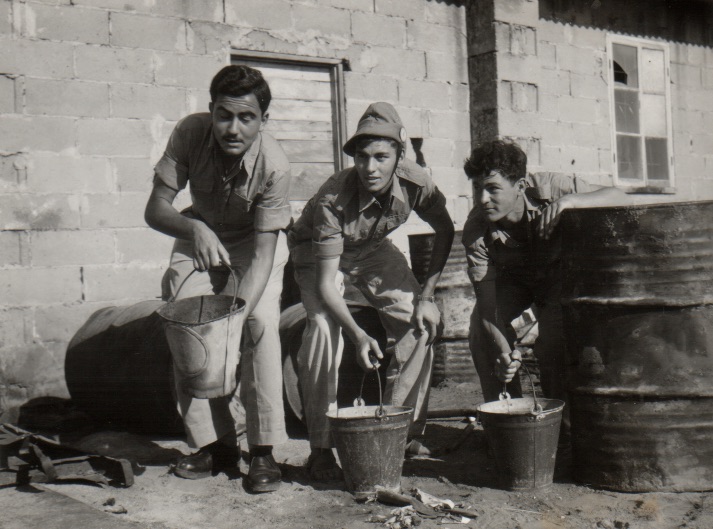
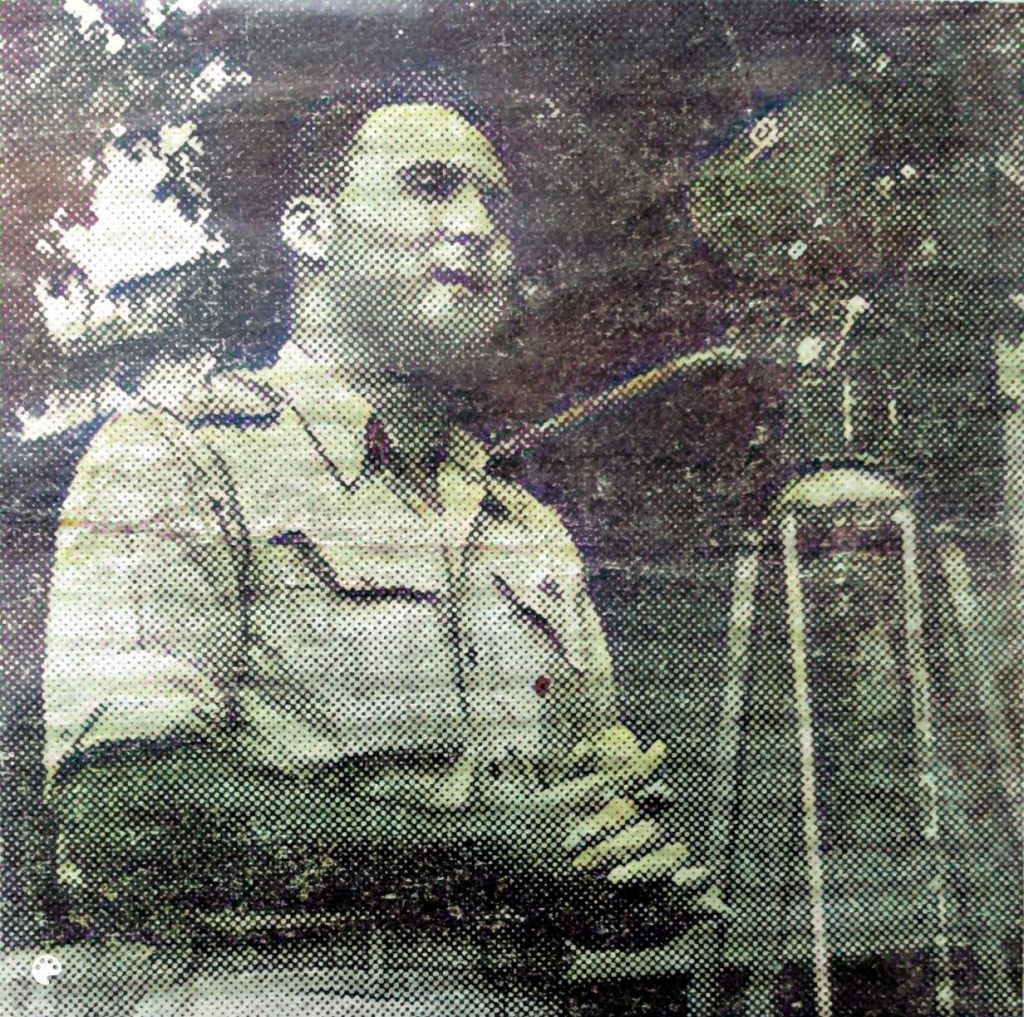
Pommy (29), during the filming of The Road to the Skies
The publicity films of the time were "characterized by pathos-saturated narration and landscape photography." Pommy said in an article by Nathan Gross, "A script has to know how to write …" Al Ha’meshmar Newspaper, November 5, 1967. "This time we didn't want another JNF film. Maybe that's why…the Prime Minister's Bureau rejected the movie, "The Road to the Skies." In the opening scene, the camera focuses on a maternity ward. Through the large windows, the camera zooms into the newborn nursery, displaying rows of bassinets. Each tiny bassinet affixed with a sign indicating the baby's profession: "farmer," "lawyer," "millionaire" and so on. In the background, the narrator says:
"If the vocation of a newborn could be known in advance, it would not be a problem to train pilots. However, since we have not yet reached this milestone, the road to the skies is still a long way off". Pommy said that the opening scene was not conservative enough for the Prime Minister's Office. Nevertheless, he was able to convince the IAF command to stand behind the film and with heavy pressure – the film came out.
The film describes the pre-military training phases of Gdna Air (the organization of the IAF, which aims to bring teenagers into aviation and air force issues). From the model aircraft, to the glider to the Piper. The film was made, so Gdna Air will introduce it at a civilian air defense conference in the United States. The film was shown on television across the United States.
“The Road to the Skies” launched Pommy's screenwriting career.
Production of the film ended in April 1955, few days before the Haifa Film Festival, when it was too late to be eligible to enter into the competition. Pommy did not give up. The day before the festival opened, he drove to Haifa, knocked on the festival director's door and got him to verbally agree that if he likes the film, it would be added into the competition. At midnight, three people entered the May movie theater: Pommy, the festival's director and screen projector.
"The Road to the Skies," the first Air Force film, entered the competition and won the "Sabra" award (Israeli "Oscar" in those days). In 1955, it was named "Best Movie of the Year." Pommy won the title: "Screenwriter of the Year."
"The critics have noted the difference between this film and other documentary films about the JNF and other institutions in the country, thanks to its human approach to the subject and the good humor that was woven throughout the movie."
"Most people will agree that life is like a movie, as long as you omit the words: The End"
Hadar Sayings
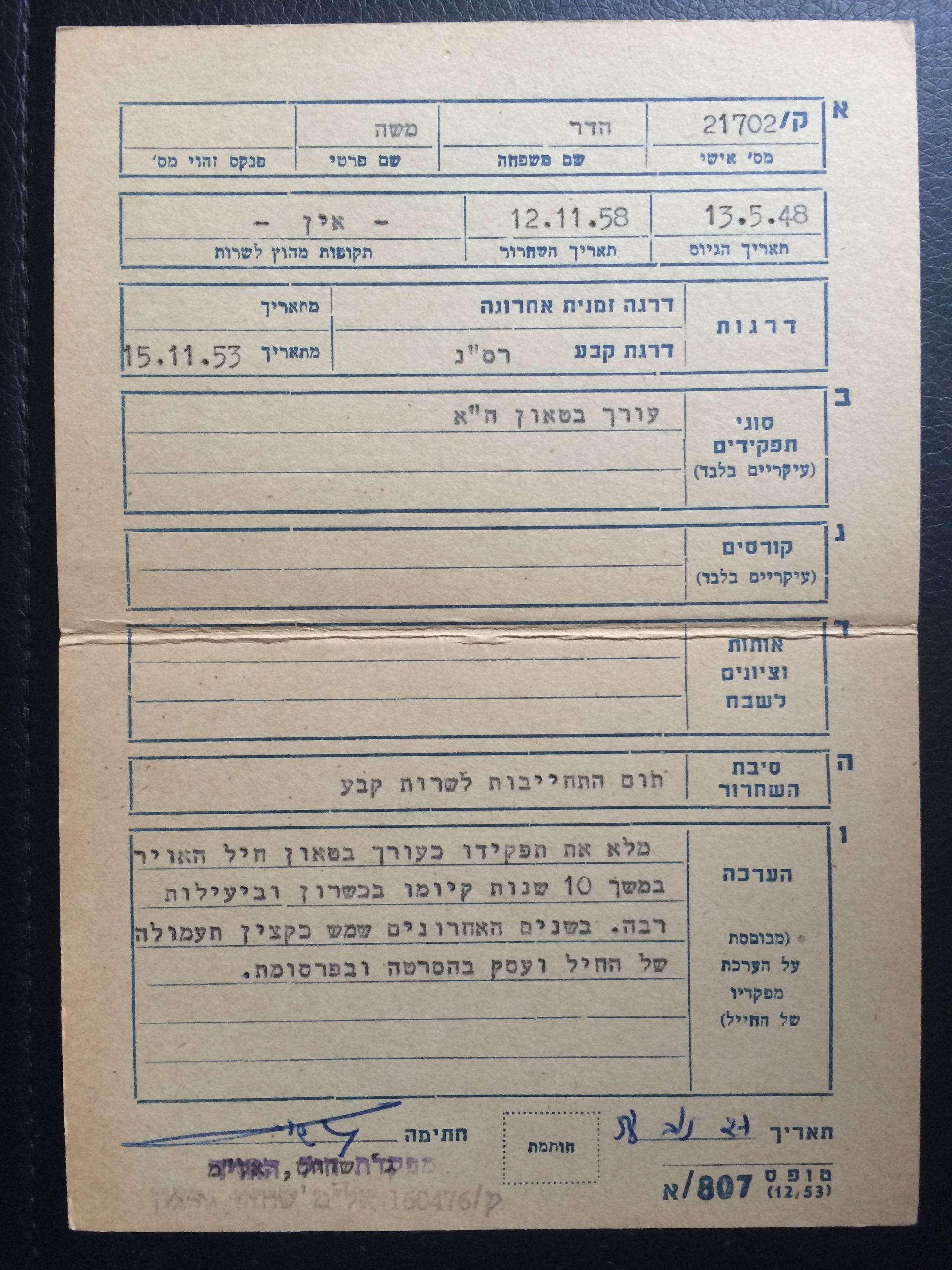
He…was Born to Be Free
It was very important for Pommy to operate in a creative environment, free from the military officer's obligations and restrictions. He enjoyed and was stimulated by his job in the Air Force, but he wanted to write books, scripts and articles without adhering to the officer’s code of conducts. His solution was honorable discharge from the military service. Forgoing early military retirement, promotions, higher ranks and benefits in order to become a “free” civilian military employee in the service of the IAF.
In November 1958, Pommy became a civilian military employee.
Looking back, Pommy made a wise and clever move. A step that suited his needs. He went on to do what he liked for the Air Force: 1. he continued to write the daily orders to every IAF commanders; 2. to edit the magazine; 3. to ran the entire public relation and advertisement department, which led to “Hatovim La’tays” (“The Best to Fly”) brand; 4. to create the war magazines and the column He… and; 5. to write as well as produce the award-winning Air Force films. Simultaneously, Pommy was able to use his pen freely, hold opinions without interference and to seek, receive and impart information and ideas through any media and regardless of frontiers.
The ability to live in two beloved worlds, without internal conflict, only sharpened Pommy's productivity and creativity as well as his contribution to the Air Force.
He...Participated in the First Screenwriting Course in Israel
In August 1964, Pommy participated in the first screenwriting course in Israel conducted by Carl Foreman. Carl Foreman was a Jewish American screenwriter, director and film producer who wrote award-winning films such as “High Noon” and “The Guns of Navarone.” He was among individuals who were backlisted in Hollywood in the 1950s of their suspicious communist sympathy. In 1952, following the persecution and witch hunt by Senator Joseph McCarthy, he immigrated to England.
Mr. Foreman came to Israel in March 1964 for the premiere of his movie "The Victors." The Israeli Film Service and the Information Authority in conjunction with the Tel Aviv branch of the Hebrew University of Jerusalem, agreed that Mr. Foreman will return in August to teach a month-long screenwriting course. This was the first step to establish the Department of Film Art at the Hebrew University. Selected writers and screenwriters who have already worked in the profession were designated to take the course.
The Moshe "Pommy" Hadar collection has the original script "The Victors," from which the group studied. At the screenplay participants' meeting, it was decided to establish The Israeli Screenwriter Plays and Television Association. The purpose of the organization was to bring together the screenwriters operating in Israel and those who may join in the future. An organizing committee was chosen consisting of 4 members including Moshe Hadar.
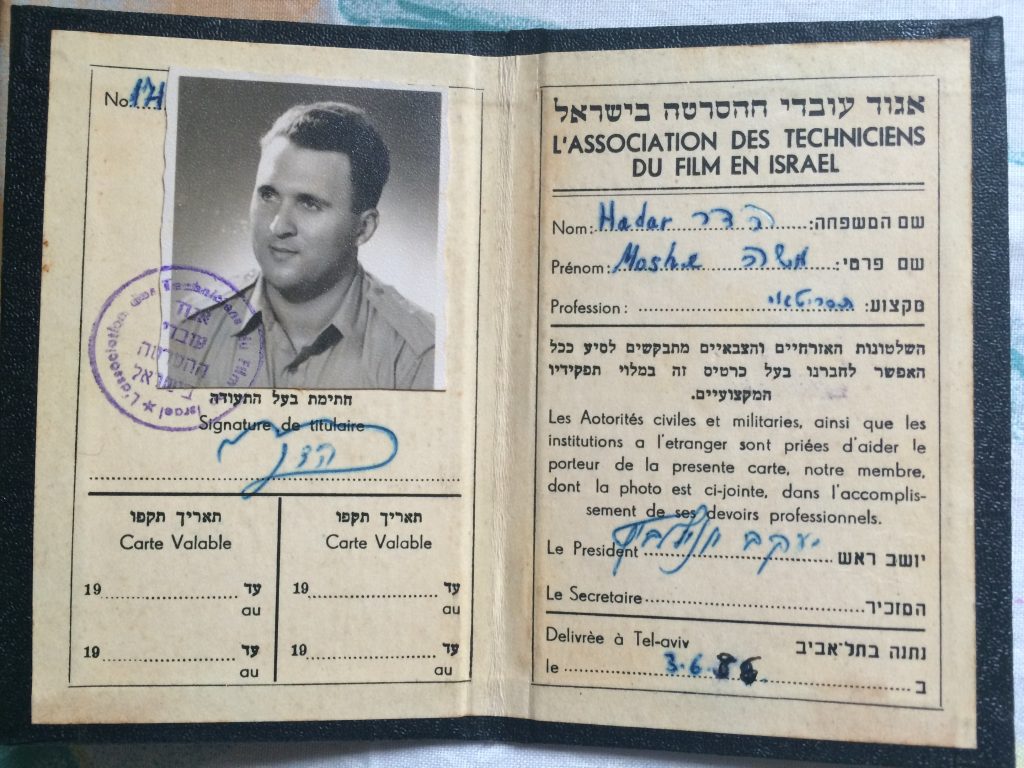
Crossing roads (or not?): In 1979, Pommy's daughter, Etti, began her clinical internship at the Thalians Psychiatry & Behavioral Health Center – Victim of Violent Crime Department at Cedar Sinai Hospital in Los Angeles. One of the clinicians she worked with was a woman, named Kate L. They got together and met at various events, parties, etc. One day while at Kate's apartment, Etti noticed a lithograph by Pablo Picasso, Dove of Peace. In her trained eye, she suspected that it was an original print. Kate told her it was her favorite gift from her father. They started talking about him and Kate mentioned his name, Carl Foreman. She talked about the time they lived in England and suddenly, Etti asked her, was he Carl Foreman, the screenwriter, of “The Bridge on the River Kwai?” Kate answered, yes.
Etti told her that she knew his name very well. Her father, mentioned him, on many occasions at their home, as the individual who taught the first screenwriting course in Israel. Later, Kate, who knew how much Etti is interested in historical documents, gave her the transcript of her father's Carl Foreman, testimony before the House Un-American Activities Committee. He testified that he had been a member of the American Communist Party more than ten years earlier while still a young man but had become disillusioned with the Party and quit. As a result of his refusal to give the names of fellow Party members, Foreman was labeled as an "uncooperative witness" and blacklisted by all of the Hollywood studio bosses.
Awards and Accolades
The Rhythm of Tomorrow
The Golden Wing, "The Rhythm of Tomorrow," the International Film Festival, Aeronautics, and Space Conquest in Vichy, France, June 21-27, 1965
Altitude 40,000
The Golden Wing award “Altitude 40,000”, the first international film, Festival Mondial du Film Aeronautics and space in Deauville, France, September 14, 1963
The Road to the Skies
The Road to the Skies," the first Air Force film, won the "Sabra" award (Israeli "Oscar" in those days). It was named "Best Movie of the Year." Pommy won the title: "Screenwriter of the Year," 1955
The After-Shock
The After-Shock was presented at the World Film Festival in Montreal and won first prize in its category in August 1967 category. The After-Shock also won the award in 1966 at the International Film Festival in Antwerp, Belgium
Jewish Marriage
Jewish Marriage won the Bronze medal at the third Film Festival in Atlanta, Georgia, Spring 1979.
Holiday on Ice
Holiday on Ice, an Amcor Fridge commercial, won First Prize, Gold Medal, in the 19th International Film and Television Festival, New York, November 1976
Air Force
Motti Hod, letter of appreciation for the resourceful effort and the speed of execution of Pommy’s department, after the shootdown of six Syrian Mig-21 combat-jets on April 7, 1967. A day later, the film presented the IAF victory and made it to public view. "My congratulations and best wishes to the officers and soldiers of the industry, and especially to Pommy and his partners”
Air Force
Commendation by Major General Brigadier General Yigael Yadin on July 14, 1950, on IAF Magazine # 9, "which is technically and culturally superb”. Also, attached is a letter from the Air Force commander, Maj. Gen. Aaron Remez, July 17, 1950
He...Met with Yuri Gagarin
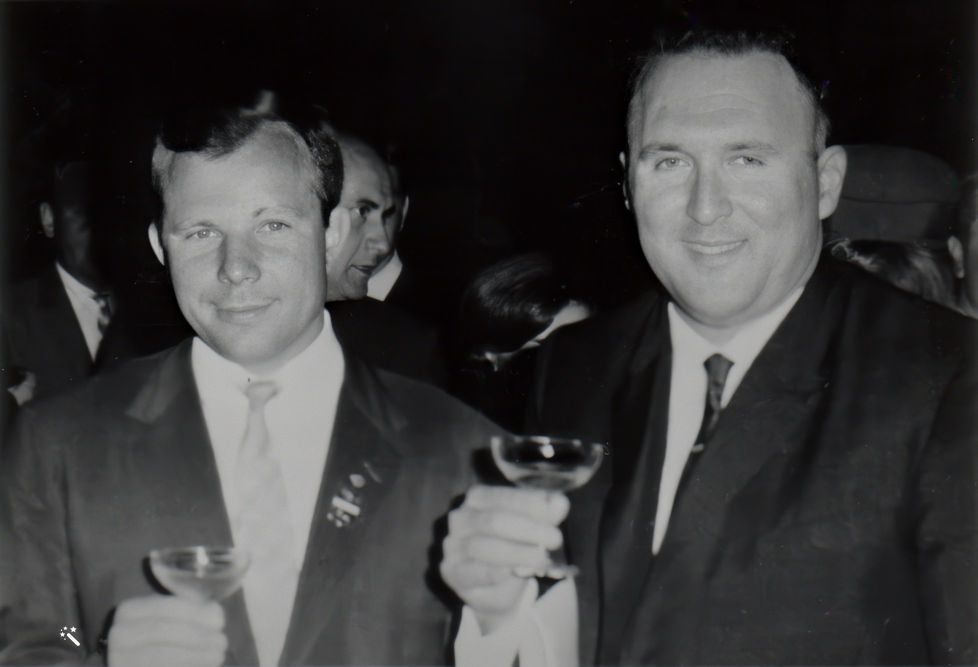
At the Aerospace Film Festival in Deauville, France in 1963, Pommy befriended Russian cosmonaut Yuri Gagarin.
Yuri Gagarin was the first human in history to journey into outer space and the first to travel around the globe and return safely to the Soviet Union. Gagarin became an international celebrity and was awarded many medals and titles, including Hero of the Soviet Union, his nation's highest honors.
Pommy, asked him, if it was possible to live in space, he smiled and replied: "Yes, certainly possible, but you can also die." (later Yuri Gagarin was killed in a plane crash). At this international film festival, “Altitude 40,000”, won the first price, the Golden Wing Award. Before the awards were presented, Gagarin approached Pommy and told him how much he and his cosmonaut, Vladimir Komarov (who later perished in a space crash) marveled at the beauty of the film. Gagarin proudly informed Pommy that he had won the Golden Wing Award and that the Russian delegation voted for his film. At a dinner event they attended together, Pommy asked Gagarin to autograph the restaurant’s menu. Gagarin took the menu (see left) and signed the menu several times, symbolizing his circling of the earth.
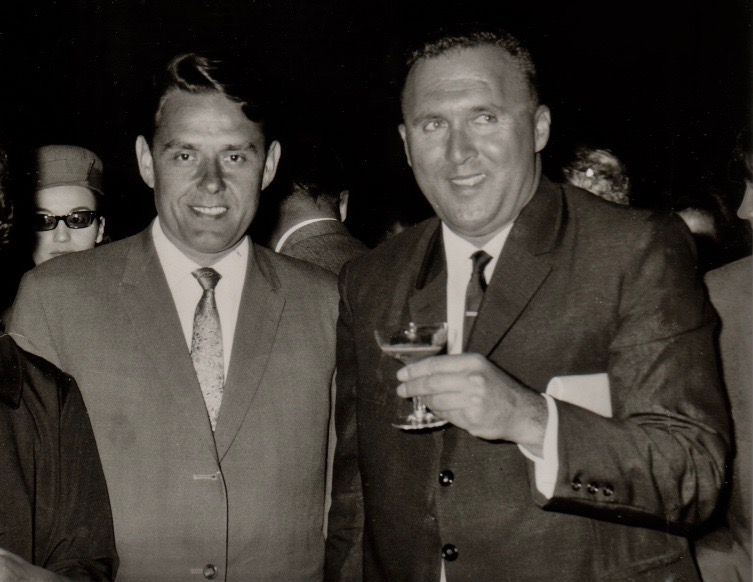
Pommy (right) with cosmonaut, Vladimir Komarov
"The earth will spin faster if we'll all lose weight"
Hadar Sayings
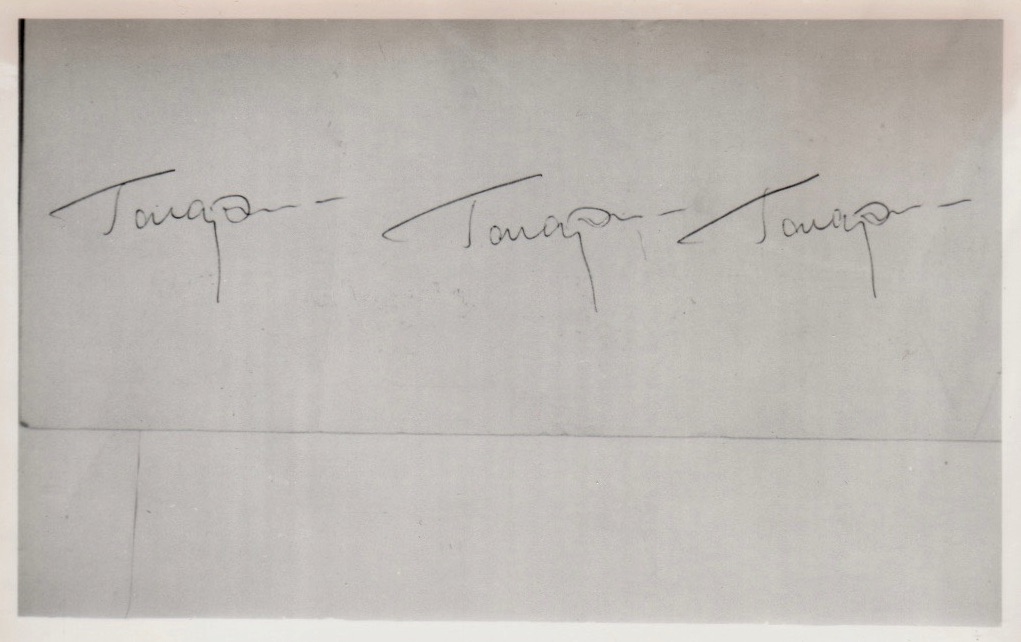
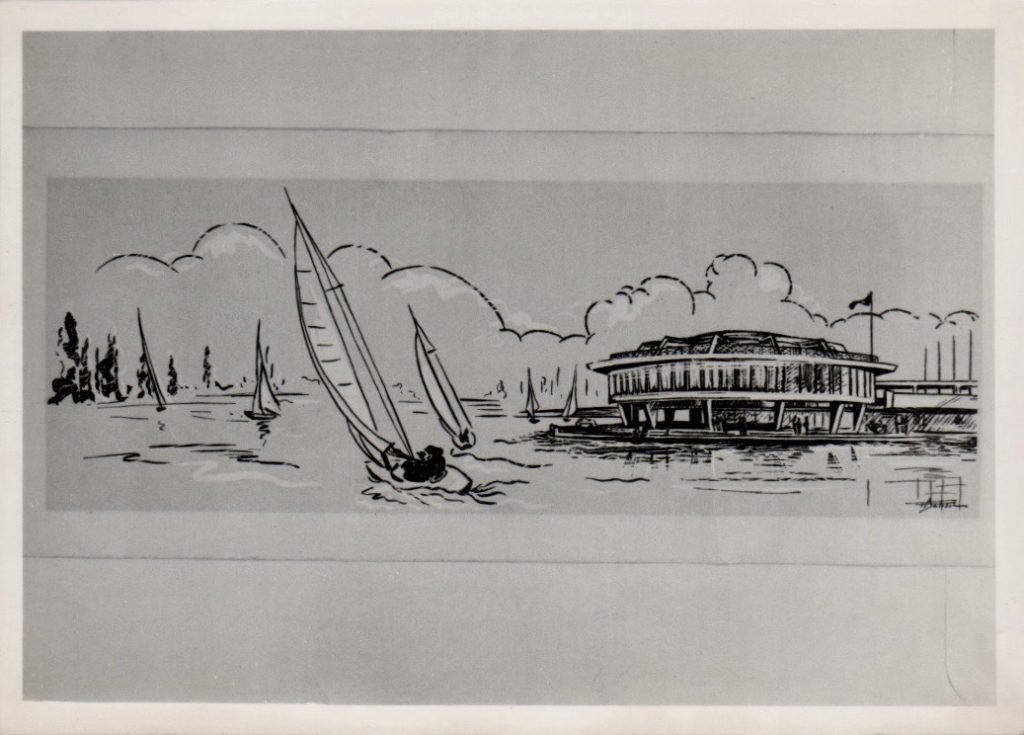
He…was Humane
In the 1963 articles “A Human Affair – as a movie,” about the film Sinia (Clouds Over Israel), it said, "and the screenwriter – the muscular, Moshe Hadar, who is worthy of being called, ‘The Screenplay # 1 of Israel’ because of his seniority and the plethora of screenplays and short screenplays which he wrote, said: In the film, 'We intend to give two perspectives on the Israeli Arab conflict. More precisely, the relationship between Arabs and Israelis. Two extremist point of views are battling each other in the film and only one is victorious: the one that advocates a fair and good humane attitude.”
As we read Pommy’s words, spoken so many moons ago, one can hear and vividly see a carbon copy image of the man and his life-long philosophy, thought process and attitude toward life and the people around him.
"Personal warmth overcomes any frost"
Hadar Sayings
He…Concocted a Bar Mitzvah High Up in the Sky
Every Saturday, Pommy and Moody used to visit one of her many family members. In 1967, Pommy's son, Ronnie was entering Mitzvoth and turning 13. It was essential for Pommy and Moody to hold the event in an unconventional place. Pommy, did not adhere nor worshiped banquet halls, and the likes. Creativity, innovation and the unique atmosphere had to be reflected in this upcoming event.On a Saturday visit to Moody's brother, Zalman Levin, who lived at 3 Maccabi Street in Tel Aviv (opposite the old Maccabi Tel Aviv basketball court), they sat on the porch drinking coffee and eating "Kopolski" cakes, discussing the location scouting to Ronnie’s bar mitzvah celebration.
Suddenly, Pommy lifted his eyes into the Tel Aviv skyline and saw the Shalom Tower. Then the first skyscraper in Tel Aviv and Israel. At the time of its inauguration in 1965, it was the tallest building in the Middle East, in Asia, and in Africa, and reached a height of 123 meters, 32 stories high. At the inauguration of the tower, the public was exposed to the first escalator in the State of Israel. In 1966, an "open roof" observatory with binoculars called "Mitzpe Shalom" started operating.
Pommy said to Zalman, maybe Moody and I will celebrate Ronni’s Bar Mitzvah in Mitzpe Shalom. Zalman, the cool and calculated brother in law, a high-ranking police commander, said (even though he didn’t believe it is possible) “why not!”
Pommy contacted the Shalom Tower’s owners and convinced them to allow his family and friends to celebrate Ronnie’s Bar Mitzvah at the Observatory. As a result of this event, Shalom Tower started to offer their services to other parties.
(This story was told by Zalman’s daughter, Tzvia)
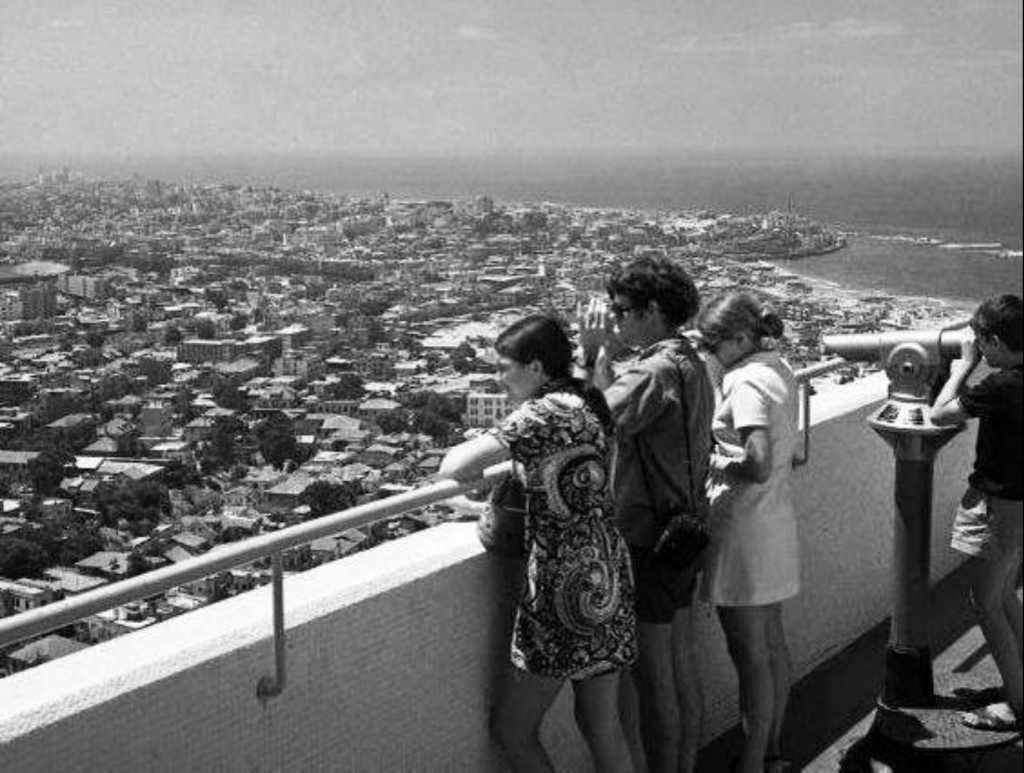
Early nineteen-seventies, a view of south Tel Aviv and Jaffa from the observation deck at Mitzpa Shalom
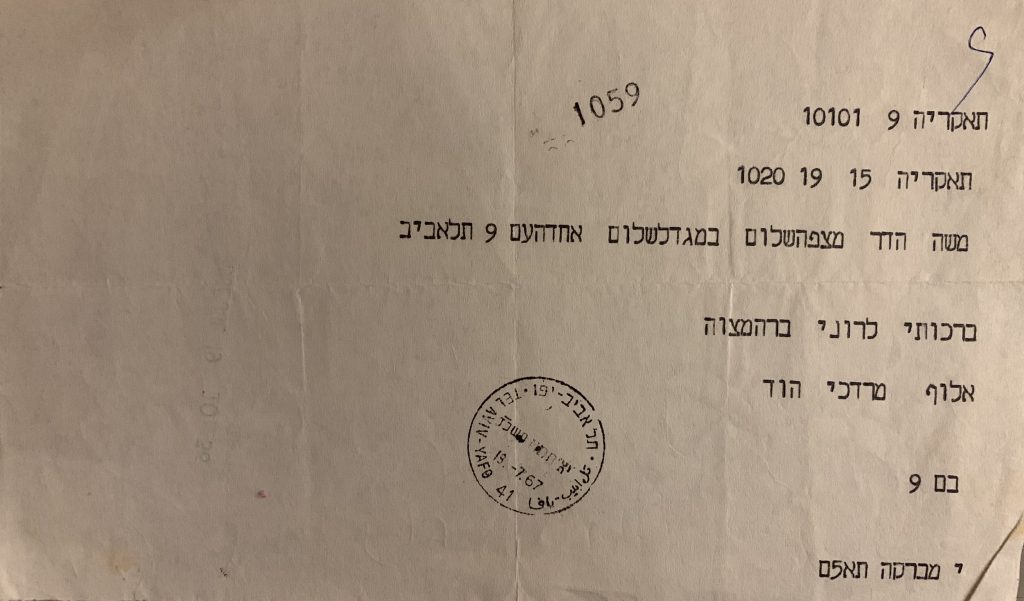
Telegram from Maj. General Mordechai Hod, the Commander of the Israeli Air Force, expressing his blessing for Ronnie's Bar Mitzvah. Sent from the AIF headquarters in the Kirya to the Observation Deck at the Shalom Tower, 9 Echad Haham Street, Tel Aviv – 19 July 1967

״דיפלומט מוצלח לא מקבל מט״ – אימרות הדר
He…was a Master Chess Player
Pommy was a master chess player. It helped him better his brain functions, improve his memory and his cognitive abilities. He thrived on strategic thinking and could maintain concentration and focus hours at the time. The fact the Pommy had undergone "left-hand conversion therapy," only improved his chess playing skills. The player engages both sides of the brain at once, and the more these sides work together, the faster Pommy solved problems, chess or otherwise. Pommy’s abstract and thinking allowed for creative problem solving. His cool and composure – the “poker” face, enabled him to sacrifice, attack, humiliate, threaten properly, captivate properly, break necessary lines and defend properly. No one, could defeat him playing chess. Each game he built like a script, like a campaign, seeing all the moves and predicting possible force majeure.
He...Wrote a Movie about the Atomic Reactor
Pommy was contracted to write a documentary screenplay for an in-house educational and instructional film about the atomic reactor in Dimona. He visited the reactor and received dozens of documents to help him put together an informative and human-interest script. The movie was made and Pommy continued in his daily life…After many years, in the early 1980s, when he and Moody decided to move to the United States, they "cleaned" their home and Pommy discovered the top-secret documents of the atomic reactor. Of course, he couldn't tell anyone, or give it to anyone.
Team Pommy and Moody arrived at Moody's sister, Yaffa’s home, on Pinsker Street in Tel Aviv. The loving and generous sister-in-law, did not hesitate, having full confidence in her beloved brother-in-law. Together, the group went up to the roof of her apartment building and there, they incinerated all the documents. What did they think about, engaging in such a dangerous and reckless act of arson … only they could answer!
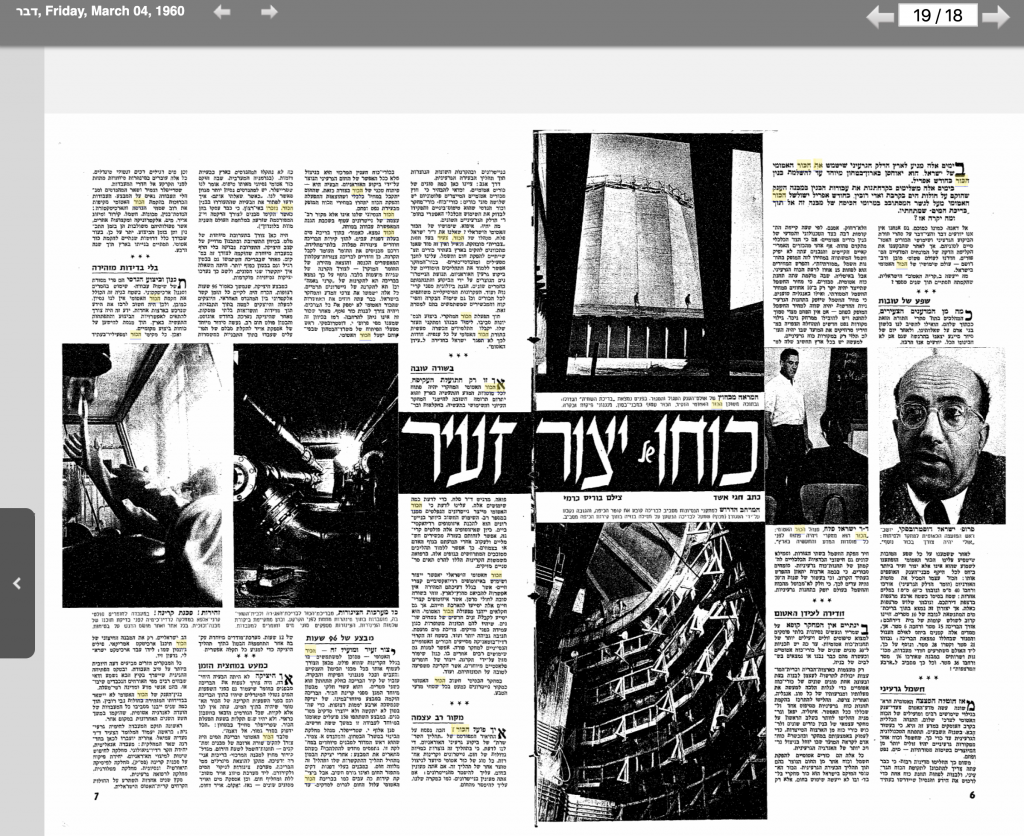

Photo by Tzidon Morr, IAFmagazine
He...Went Down to the Pit
On Friday, October 5, 1973, on the eve of Yom Kippur, just minutes before Seuda Mafseket—Meal of Cessation—before the Yom Kippur fast, Moshe “Pommy” Hadar returned, to his home in Ramat Aviv, from the Israeli Air Force * Bo’r, the pit (the operational command center bunker in Tel Aviv’s Kirya). During the pre-fast meal, Pommy informed his family of the uncertain and volatile security situation and that the prospect of war is high, although the IDF Directorate of Military Intelligence’s (Aman) chief was confident that the probability of war was low. Pommy, the strategist and tactician, the constant chess player, said, "The force (IAF) is getting organized." He noted that according to all the data, assessments and information he was exposed to, "the likelihood of war is high.” The next day, Yom Kippur, at 6 am, the phone rang at Pommy's home. He was asked to get to the IAF headquarters at once. He left his home and drove on the deserted Tel-Aviv-Haifa road to the Kirya. He then went down to the pit with the top air force commanders and the IDF General Staff. Pommy didn’t contact his family until after the first siren sounded around 2 p.m.
It is a small world : *Few years later, when Pommy's daughter, Etti, served in the Israeli Air Force – Air Photography Unit, she was assigned to photograph the construction of the new pit in the Kirya. Every week, she walked from her base, down the street and beyond…and captured the images.
His roles as editor in chief of the IAF Magazine, the author of the daily mission command, and his responsibilities as the chief public affairs for the IAF, brought Pommy down the pit on many occasions. One other time, he mentioned being in the pit, was during Operation Opera – the bombing of the atomic reactor in Iraq. On June 7, 1981, Pommy and group of militaries and IAF commanders stayed in the pit until all the planes returned safely to base, no one left the pit!
In 1983, Pommy wrote the movie "Wings," a docudrama, about the Iraqi reactor attack.
"The end of one war is the beginning of a new war"
Hadar Sayings
He…Wrote Skits for Noah’s Ark
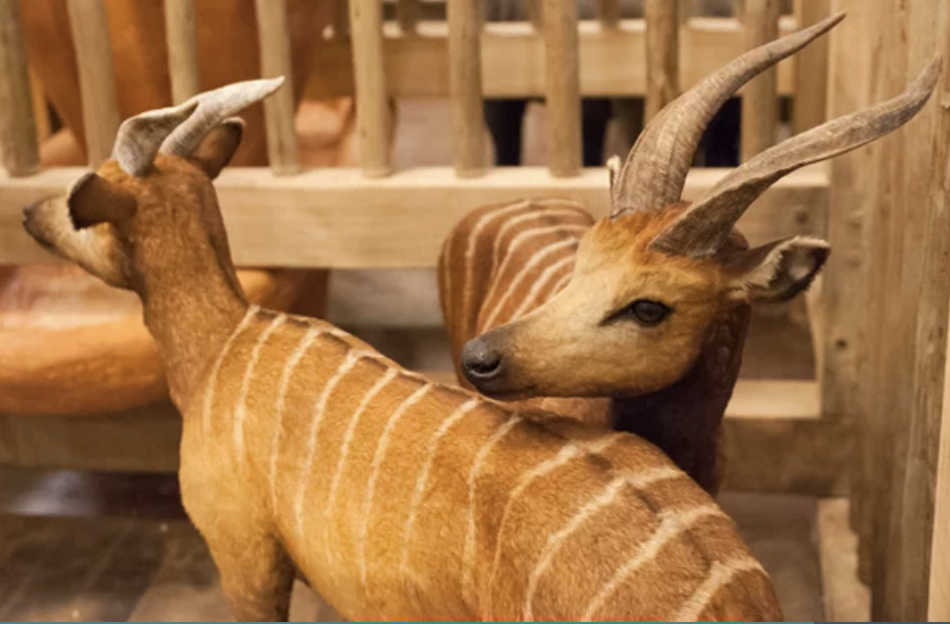
Pommy wrote dozens of skits and appeared in many comedy clubs and talk shows
“Noah's Ark”, was established during World War II, for the purpose of entertaining the allied soldiers serving in Israel: British, Australians, New Zealanders and others. After the war the place served as an officer club of Her Majesty's Arm Forces. In 1946, five British officers were abducted from the “Ark” by the Irgun, and held as hostages to prevent the hanging of underground fighters. When the state of Israel was founded, the club was given to IDF soldiers and became a popular entertainment program of songs and skits. Pommy wrote many skits that were delivered at the club by various entertainers.
In its inception, the program was accompanied by the Air Force Orchestra conducted by Major Erich Teich (with permanent singer Freddie Dora) and only later other orchestras played, such as that of Roman Messing and Isaac Graziani. The program broadcasted live, every Tuesday at 7:45 pm, from “Noah’s Ark” at 91 Hayarkon Street, Tel Aviv in collaboration with the Soldier's Welfare Committee.
The hall accommodated 500 seats. Each night, the tickets were sold out immediately upon release, nevertheless and 200 additional "Havras" always pushed in creating mayhem and scandals. The military police could not control the crowd. It is told that once a bunch of paratroopers on leave from their respective base, arrived and found the door closed – they broke it down…the studio immediately activated a generic music loop – and the program opened 6 minutes later.
In June 1959, the entertainment club was purchased to establish another wing for the Dan hotel, which was located next door.
In October 1960, the Noah box program was replaced by "Damn it."
For three decades, one prominent comic duo starred in the Jewish world, transcending all other duo and ensembles – Shimon Dzigan and Israel Schumacher. Pommy wrote many satirical skits for this comic duo.
Their story is not only about the artistic and entertainment world of parody, but also the historical story of the Jewish people in the 20th century. Their repertoire included dozens of Yiddish plays (some in Hebrew as well), and they sparked cultural changes in the European Jewish world and in the young state of Israel, as no cultural duo did before them.
The duo drew comparisons to Abbott and Costello. Natan Gross, wrote (2010), "The performances of Dzigan and Schumacher typically opened with skits based on items from daily newspapers. Their humor was aimed at anti-Semites and government functionaries, but also at themselves and their public. Routines based on domestic life would follow. Dzigan’s persona was that of a hyperactive, happy beggar, endlessly complaining about life as he darted about the stage with his signature red handkerchief hanging from his pocket. The bespectacled Schumacher, in fundamental contrast, was phlegmatic and restrained, glossing his Jewish troubles with subtle gestures of the shoulders and hands."
True Story
In the mid 1950s, Dejigan and Schumacher were about to open another performance in Tel Aviv. Ticket sales to the opening night were flat and/or stagnated. They feared a devastating opening or even cancellation of the show. Dejigan and Schumacher contacted Pommy, who had written them many skits, including some for this specific show. They asked him to find a gimmick that would not cost them money, but will help boost ticket sales in the ensuing few days before the premiere. Pommy advised that one of them will climb atop the apartment building across the street from the Ca’seat cafe, in Dizengoff Street, during rush hour and stand on the roof threatening to jump. The writer is not certain whether it was Simon Dejigan or Israel Schumacher, who climb up to the roof, but one of them indeed threatened to jump. Of course, a crowd gathered around along with first responders. Immediately the rumor mill started, that the duo is depressed, that they are not able to sale tickets to the performances, etc. The event generated a buzz! All tickets for the opening night were sold out and all other performances were also sold out.
For people who knew Pommy’s modus operandi, it's easy to grasp how his creative mind influenced and amplified emotions and public awareness to turn individuals into consumers, who actually purchase the product (in this case tickets) in the real world.
He…Wrote the Movie
that Became a Reality
on 9/11
CAPITOL
HELL
1986

The synopsis and script "Capitol Hell" were written by Moshe "Pommy" Hadar, between the years 1984-1986, seventeen years before the September 11, 2001 attacks. Four passenger airliners operated by two major U.S. passenger air carriers (United Airlines and American Airlines)—all of which departed from airports in the northeastern United States bound for San Francisco and Los Angeles—were hijacked by 19 al-Qaeda terrorists.
Two of the planes were crushed into the North and South towers of the World Trade Center in lower Manhattan. A third plane crashed into the Pentagon building in Arlington, Virginia. The terrorists' intention was to crush the fourth plane into the White House or the Capitol Building in Washington DC, but after a fight between the passengers and the hijackers, the plane crashed in an open field in Stonycreek Township near Shanksville, Pennsylvania.
In the original script (see synopsis below) written by Pommy, a terrorist organization, supporting the Ayatollah Khomeini, recruits an American pilot, a Vietnam War hero and train him for a suicide mission – hijacking a commercial Boeing Jumbo passenger plane from Kennedy Airport en route to New Orleans. Along the way, the plane changes direction, intent on crashing and blowing it up on Washington DC Capitol Building.
He... Prevented an Explosion Inside Dizengoff Center on Purim
The city of Tel Aviv was bustling more than ever in the afternoon of Purim, schools were out. Children were dressed up in costumes and make-up. A huge explosion cut the joy of the holiday. The attack on Dizengoff Center was a suicide bombing that occurred on Taanit Esther (Purim Eve), March 4, 1996, outside Dizengoff Center. In the attack, committed by a suicide bomber, a member of Hamas, 13 people were killed and 125 injured. A suicide bomber, from the Ramallah area, was smuggled to Israel via the Karni crossing and reached his destination the Dizengoff Center mall. Noticing security guards stationed at each entrance and checking attendees and their bags with handheld metal detectors, he changed his original mission and blew himself outside in the middle of the crosswalk next to Dizengoff Center.
This attack could have been more severe’ if the terrorist had entered the mall.
Now, for the first time, we publish the reason why the terrorist changed the original location of the attack and didn’t enter Dizengoff Center?
At the end of February 1996, Pommy arrived in Israel, at the request of Shmuel (Sammy) Flatto- Sharon, to help him prepare a campaign (as a close friend, Pommy informed Sammy, in advance, that the events in the past years, since his original election to the Ninth Knesset, are not in his favore and the chance of getting elected this time around are slim to none).
Every day, Pommy would come to Sammy's offices, located atop Dizengoff Center. He would talk to Sammy about new ideas and showed him graphic sketches. On March 4, 1996, as most days Pommy arrived at Dizengoff Center around 11-11:45 am. His wife, Moody, also joined him.
Earlier, that day, Pommy’s reading glasses were broken. Moody suggested that she will get them repaired at an optical store in the center.
Upon arriving to the entrance at Dizengoff Center, a security guard, did not check them this time! Moody held a handbag and Pommy held a portfolio. Pommy did not say anything to the security guard. Moody went on to hand over the glasses for repair and Pommy went up to Sammy’s office. Upon seeing Sammy, Pommy drew his attention to the lack of security in the entrance to the mall. Sammy immediately summoned his security officer. Sammy demanded to equip all security guards with handheld metal detectors and to open each bag, in accordance with the security protocal.
Moody arrived at Sammy's office and informed Pommy that the glasses would be ready by 4 p.m. Normally, Pommy stayed to work at Sammy's office, until 3:30 pm He agreed with Moody that she would return to Sammy's office at 3:30pm and that they will go down together to pick up the repaired glasses at four o'clock. Meanwhile, Moody went to see her sister, Yaffa, who lived nearby. Moody returned to Sammy's office around 3:30pm and waited for Pommy.
The blast at the crosswalk took place at 3:50 p.m.
That day Pommy saved many people, including himself and Moody. A friend of Pommy (Shmulik F.), wanted to contact a friend who was a correspondent, so she could interview Pommy about the events leading to the explosion. Pommy refused to extol over the tragedy and bereavement of others. Only several people know about this event.
If Pommy’s glasses were not broken, Pommy and Moody would leave Sammy's office at 3:30 and pass through the crosswalk during that tragic time.

He...was the King of Lucid Dreams
Pommy naturally saw beyond the boundaries of things that cannot be explained by common knowledge. He had possessed vision, an ability of clear-sightedness and perceive the future. Pommy did not claim to have any supernatural qualities, he simply channeled and developed this gift for creativity purposes. He accepted it as part of him. Often Pommy will discussed Carl Jung's theory of "synchronicity" or "coincidence and causal connections" as well as "Lucid Dreams". Pommy didn't have to explain things by way of just cause and effect. He believed that things happened at the same time regardless of the causality between events, but as meaning and connection between all things, which he always strived to find and connect.
Conscious dreaming was part of Pommy's creativity. A phenomenon that he particularly enjoys and developed. He was aware that he was in a dream and gained some amount of control over the dream characters, narrative, and environment. This cognition allowed him to navigate the dream according to his wishes, to whatever (or not) virtual reality he would like to enter. It gave him the opportunity to process future information and experiment with a variety of mistakes, deal with situations of struggle, failure and victory, likes and dislikes, to experience a range of complex emotions and to manipulate the direction according to the appropriate variation. As soon as Pommy awaken, he immediately wrote down the events.


He...the Wizard of Practical Jokes
One of the things that Pommy liked to engage in were practical jokes. Sometimes he "recruited" his daughter, Etti to help him with the pranks. His wife, Moody named the pair, "Bonnie and Clyde," and their mischiefs were not always to her liking, but she understood that sometimes “kids will be kids” and knew how naughty, childish and impetuous they could be…
Once, Moody sent Pommy to buy groceries at the supermarket on Brodetsky Street in Ramat Aviv. He took his daughter with him. When they came into the store, Pommy approached the manager's desk and told him that he couldn't find egg carton without yolks (remember, at the time, consumer-conscious eating of plant-based diet was not prevalent). The manager looked at Pommy and said, but eggs don't come without a yolk. All eggs have egg white and yolk. This is how the chicken lays the eggs. Pommy, earnestly and respectfully continued, insisting on eggs with albumen only. Pommy talked to the manager so convincing that before he left, the manager promised to find an egg grower, who may be able to help him.
The other favorite pranks by Pommy, before the era of cell phones, took place (many times) in either congested public transportation, like a bus or in an elevator – the best locations to release information – the crowd confined, tired, bored and always in search of excitements. Pommy would strike a conversation with his accomplice, about an imaginary "gory crime" – how a perpetrator killed someone and hidden the body under a bed. Pommy will continue to embellish the details and circumstances adding all kinds of frantic colors and descriptions as the captivated audience became both curious and uncomfortable.
He...Wrote Topical Material Columns
Pommy would get up in the morning and read all the newspapers of the day, listen to the news, surf the internet and allowed his gray cells to knead the headlining/important news and current affairs to a satiric raisin. Practicing his mind and finding daily challenges left Pommy, always, informed, sharp and alert. For years, Pommy had written humorous-sniper columns published in the various newspapers under the names: "Small Bins", "Exclamation Point", "Tearing Into", "The Other Half", "NewsWhip," "On the Rivers of Beverly-Hills" and more. Going through these raisins, today, one gets a humorous-historical snapshot of the daily and political issues from those years, which in many cases integrate and connect into today’s events.
He...Wrote Tzimukim - (translate) Raisins
Play-on-words were the fuel or rather the spark, which started Pommy’s daily activities. He was committed to, and adopted puns, oddly formed sentences and double intenders as a major feather of his work. He relished on this literary technique and mastered it to perfection. Surprise phrases, amusements of the language, anecdotes, and humorous use of a word with more than one meaning or that sounds like another word were his oxygen. The Raisins (Tzimukim), he said, "are small, sweet, tasty and produce a quick smile." Pommy was a Hebrew-Hebrew walking dictionary 24/7. He searched and studied the multilingual meaning of the word that sounded similar. He did all this to get a clever rhetorical effect. In addition to writing raisins, he used play-on-words and visual metaphors in ad campaigns.
"Life and Death are in the power of the tongue and the gun"
Hadar Sayings
He...the Punster wrote the Hadar Sayings
In October 2008, Pommy wrote an introduction to the book "Hadar Sayings", which includes over 3700 puns and subtle manipulation of the language, encompassing many subjects of our daily life. He noted, "For those who like to read not only between the lines, but also between the letters of our language, I have composed a new selection of sayings, improved and enhanced phrases, small jugs, amusements and word games, utilizing the virtues and colors of the Hebrew language. It is an attempt to give an awakening smile and a visual language, which is not only written or heard, but also seen. In short, there is visualization of the language here.”
Note: Most of "Hadar Sayings" exploit multiple meanings of a term, or of similar-sounding words in Hebrew, for an intended humorous or rhetorical effect. Pommy knew how to intentionally use the Hebrew language via homographic, homophonic' metonymic, or figurative means. Therefore, many of the Sayings cannot be appreciated in any other language but Hebrew.
The (few) enclosed Hadar Sayings, were translated with the hope of conveying a taste of Pommy's thought process, style and sense of humor
The only trash that doesn’t smell is the one on your computer
Never order lemon from a sour-faced waiter
Dirty tricks cannot be cleaned with soap and water
The abusive husband claimed to have bitten his wife with kid gloves
Smart parrots refuse to imitate fools
An anchor could also be used on dry land
Among the beautiful people there are many ugly
Blood-thirsty individual doesn’t quench his thirst by drinking Gatorade
Often the ringtone is more pleasant than the conversation that ensued
If Adam and Eve were not deported, we would be living today, in paradise
Without water we could not cast our bread
A lame duck could still taste delicious
Graffiti is the only writing on the wall you can read
A party full of smoke could also be the result of a fire
During a fight, choose the stick rather than the carrot
Love sickness also requires lying in bed
Don’t burn calories in a fire zone
A dirty old man usually wears clean clothes
Leave an abusive partner before the first blow
She fell for his charms and broke her heart
He...Pulls the Wool Over Your Eyes
In the 1960s, Pommy and Moody lived at 3 Schderot Keren Kayemet, in a miniature apartment, kitchenette, bathroom, children's room, Pommy's study, living room that each night turned to the couple’s bedroom. Pommy used to joke that he developed his muscles by moving the couches every evening and every morning.
Once in a while, a woman would come to help with domestic chores. Moody asked the woman, that when she enters into Pommy’s study, to do it quietly, since he is working.
One day, the woman came out of the study distraught. Moody thought, that Pommy, "tested" one of his jokes on her.
She asked the woman, if everything is okay?
The woman, at first, squirmed uncomfortably, but after a few moments she told Moody, I want to tell you, that your husband is lying to your face!
Moody, a little embarrassed and confused, didn't understand the sudden outburst.
She asked her, what is he lying about?
The woman answered: You told me to be quiet, because he works. That's not true, he sits in an armchair and reads the newspaper!
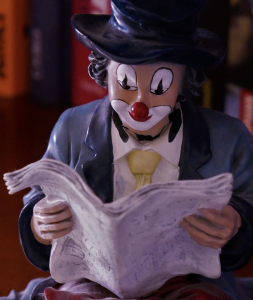
He... the Giant Shadow
Many memories of Dad are engraved into my heart. But one memory is very special: It is the small hours of the night. The call of nature wakes me up. I find myself walking through the hallway toward the bathroom, but like a fly, I’m drawn to the stream of light coming from Dad's study. I stop and lean against the doorframe, gazing quietly at the floor to ceiling giant shadow against the bookshelves. Dad leaning atop his massive teak desk, holding the eternal pen as he resolutely releases the magical letters. This gifted man places each gem in its place, gathering them into a string of pearls atop a sheet of white paper. His attentive face is illuminated by a single lamp as his upper body casts the familiar and beloved giant shadow. I don't think he ever noticed me. But I always knew he would be there
Note: This photo was taken when I was 19, in 1975, during the daytime. After many years, I realized that my subconscious needed to freeze this beloved moment and to capture this sense of tranquility and safety.
